

Diamondback Terrapins
MITIGATING THREATS TO THE MOST BELOVED REPTILE IN THE CHESAPEAKE BAY









Arts & Culture
14 Events highlights special celebrations and activities to enjoy this month by cali schwerdtfeger
18 Attractions is your guide to this fall’s Annapolis Boat Shows by dylan roche
20 Social showcases photographs of recent charity events
22 Business & Community features local business and community news
24 Environment profiles the Maryland Association for Environmental and Outdoor Education by lisa a. lewis
26 Education profiles student-athlete Avery McCall of Sts. Peter & Paul by tom worgo
28 Interview with Baltimore Ravens’ second-year tackle Roger Rosengarten by tom worgo

Features
30 Diamondback Terrapins is the next installment of our Chesapeake Bay Species article series and explores the aquatic world of our state reptile, their biology, and mitigating environmental threats by lisa a. lewis
39 School Visitation Guide offers advice for the upcoming season of preschool, grade school, and college visits, including listings of select schools, open house dates, and need-to-know contacts
44 Daycare 101 covers the many variables that parents and guardians of youngsters should consider when vetting childcare options and daycare centers
SEPTEMBER 2025
On the Cover: We learn all about our state reptile in the article “Diamondback Terrapins.” Design by August Schwartz What’s Up? Eastern Shore online at whatsupmag.com. Please recycle this magazine.




Home & Garden
50 Featured Home: Modern Drama showcases a dynamic two-story farmhouse-style home that reflects its idyllic waterside setting in St. Michaels by lisa j. gotto
60 Interior: Fall Home Cozy features our newest favorite fall interior enhancements by lisa j. gotto
62 Contemporary Town Living steps inside a three-bedroom riverside home in Chestertown by lisa j. gotto
64 Miles of Tranquil Waterfront visits an outstanding waterfront property in Tilghman by lisa j. gotto
Publisher & President
Veronica Tovey (x1102)
Editorial Director
James Houck (x1104)
COO & Director of Advertising
Ashley Raymond (x1115)
Contributing Editors
Lisa J. Gotto, Dylan Roche
Contributing Writers
Janice F. Booth, Lisa A. Lewis, Tom Worgo
Contributing Photographers
Patty Hill, Chris Perini/A Digital Mind, Bill Whaley
Art Director
August Schwartz (x1119)
Graphic Designers
Matt D’Adamo (x1117), Lauren Ropel (x1123)
Web Content Specialist
Arden Haley
Production Coordinator
Amanda Stepka
Social & Entertainment Media Associate
Cali Schwerdtfeger
Senior Account Executive
Kathy Sauve (x1107)
Account Executives
Beth Kuhl (x1112), Nina Peake (x1106), Haley Raymond, Michelle Roe (x1113)
Sales Assistant
Ia Louisse Horton
Finance Manager
Deneen Mercer (x1105)
Bookkeeper
Heather Teat (x1109)
Executive Assistant
Regine May Gelera




What’s Up? Eastern Shore is published by What’s Up? Media 900 Bestgate Road, Ste. 202, Annapolis, MD 21401, 410-266-6287, Fax: 410-224-4308. No part of this magazine may be reproduced in any form without express written consent of the publisher. Publisher disclaims any and all responsibility for omissions and errors. All rights reserved. Total printed circulation is 20,123 copies with an estimated readership of 60,675. ©2025 What’s Up? Media Home Grown, Locally Owned: This issue of What’s Up? Eastern Shore employs more than 25 local residents.

by dylan roche


72 Tiki Flair Meets Fusion Cuisine visit with the owner and chef of Tiger Lily in Easton by tom worgo
74 Readers’ Dining Guide offers local restaurant listings for your consideration
80 Where’s Wilma? Find the What’s Up? Media mascot and win
Home industry professionals and firms may submit their completed projects for evaluation and vetting in 13 award categories. Entries—consisting of a project description and accompanying photographs—open September 1st and close October 31st.


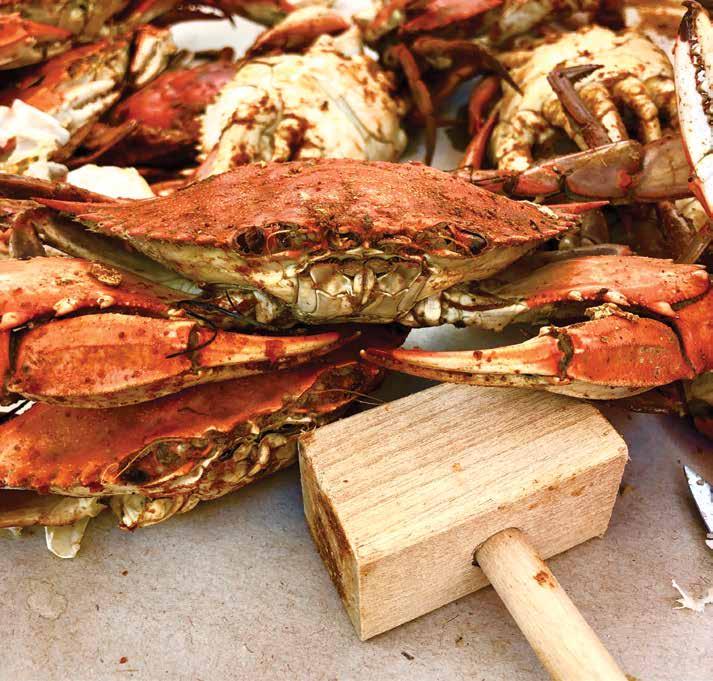

Annapolis Baygrass Music Festival
Experience bluegrass with a purpose at the Annapolis Baygrass Music Festival, September 20–21 at Sandy Point State Park. This feel-good weekend features top Americana and jamgrass acts, plus local food, artisan vendors, and a strong focus on mental health and Chesapeake Bay conservation. Whether you’re grooving by the main stage or lounging in the grass, it’s a celebration of music, mission, and waterfront beauty. More info: baygrassfest.com
BAY BRIDGE PADDLE
Grab your paddleboard or kayak and take on the Chesapeake Bay during the Bay Bridge Paddle on Sunday, September 14. This one-of-a-kind race offers three course options under the iconic Bay Bridge, drawing paddlers of all levels to Sandy Point State Park. After the race, stick around for live music, food vendors, and festivities as part of the Maryland Seafood Festival. It’s equal parts adventure, community, and shoreline fun. More info: baybridgepaddle.com


ST. MICHAELS CONCOURS D’ ELEGANCE
Step into a world of vintage luxury at the St. Michaels Concours d’Elegance, taking place September 26–28 at the Kent Island Yacht Club. Admire rare classic automobiles and sleek wooden yachts while enjoying live music, upscale vendors, and fine waterfront views. Sunday’s public show is perfect for car enthusiasts and families alike, offering a stylish day on the Bay. More info: smcde.org | 410-643-4101

Ride for Clean Rivers
Hop on your bike for a good cause at the Ride for Clean Rivers, taking place Sunday, September 21. Hosted by ShoreRivers, this scenic cycling event features 20-, 35-, and 62-mile routes through the beautiful backroads of Talbot and Queen Anne’s counties. Enjoy rest stops, waterfront views, and a picnic celebration—all while supporting clean water efforts on the Eastern Shore. More info: shorerivers.org | 443-385-0511



ANNAPOLIS SONGWRITERS FESTIVAL
From September 11–14, the streets of downtown Annapolis come alive with music during the Annapolis Songwriters Festival. Experience acoustic sets, songwriter showcases, and headline concerts from both rising stars and established names. Venues range from cozy pubs to stages by the water, creating a dynamic and intimate musical atmosphere all weekend long. More info: annapolissongwritersfestival.com

Maryland Seafood Festival
Feast your way through a Chesapeake Bay tradition at the Maryland Seafood Festival, happening September 13–14 at Sandy Point State Park. Enjoy steamed crabs, fresh-shucked oysters, chef demos, local vendors, beer tastings, and a kids’ zone— all with beautiful bay views. With something delicious around every corner, this is your end-of-summer excuse to indulge in all thing’s seafood. Bring the whole family for a weekend of fun and flavor. More info: marylandseafoodfestival.com.

THE WHARF RATS, LIVE!
Mark your calendar for Friday, September 19 and enjoy an upbeat night with The Wharf Rats. This Grateful Dead tribute band brings good vibes, timeless jams, and high energy to every show. Whether you’re a long-time fan or just looking for a laid-back night with great live music, this show promises a fun time for all. More info: cultclassicbrewing.com | 410-980-8097

3RD ANNUAL LIL’ AMP’S BENT RODS FISHING TOURNAMENT
Cast your line for a cause at Lil’ Amp’s Bent Rods 3rd Annual Fishing Tournament on Saturday, September 13 (rain date: September 14). Launching from Red Eye’s Dock Bar in Grasonville, anglers compete for big prizes—$15,000 for the heaviest striped bass and $2,500 for the largest catfish. The day includes weigh-ins, live music, and a celebration, all while raising funds for Project Restart. It’s a feel-good way to spend a day on the water. More info: notmychildinc.org | 410-216-9309



All Aboard!
WHAT TO EXPECT AT THE ANNAPOLIS BOAT SHOWS
By Dylan Roche
nyone living anywhere close to the Chesapeake Bay is probably familiar with the full-throttle fun of spending the day cruising or sailing around on the water. You either own a boat yourself, know a friend who owns a boat, have chartered a boat, or are potentially thinking about getting a boat. In any case, two of the region’s big events of the year—the Annapolis Boat Shows—have everything you need and are coming up in early October.
AThe Annapolis Powerboat Show is October 2–5, followed by the Annapolis Sailboat Show the next weekend, October 9–12. Both shows run 10 a.m. to 6:30 p.m. Thursday, Friday, and Saturday, and 10 a.m. to 5 p.m. Sunday, and all
four days of each weekend offer a chance to learn, shop, tour new boats (and try them out), and comingle with your fellow boaters and boaters-to-be against the backdrop of Annapolis City Dock.
“What makes this really fun is miles of docks with boats,” says Mary Ewenson, president of Annapolis Boat Shows. “We bring in two miles worth of floats to build docks and line all the boats up. All the boats are open for people to get aboard, go down below, check it out…It’s not like going to a car show at a convention center where you stand behind a velvet rope and look at the boats from far away.”

In fact, that’s one of the biggest draws of the boat shows. Attendees always love getting aboard the boats to tour them, check out the amenities, and even take them for a demo run out on the water to get the full experience. All the dealers and manufacturers will have reps on hand at the boats to answer questions.
Because the boat shows have been traditions in Annapolis for more than 50 years, each year means a mix of longstanding traditions with new and exciting additions to the activities. As in years past, there will be a VIP barge with refreshments and an open bar, tents full of exhibitors with the latest boating gear and attire, and education opportunities through daily seminars (including topics like “Using a Navigation App,” “Solo Racing Around the World,” “Weather 101,” and more). There will even be a first sail workshop for people interested in learning to sail for the first time.
FIRST TIME AT THE ANNAPOLIS BOAT SHOWS?
Ewenson has some valuable tips and advice for getting the most out of your time and having as much fun as possible:
◆ Wear shoes that are easy to slip on and off. Some of the boats won’t allow shoes (they might scuff the deck), so you’ll need to take them off when you go aboard.
◆ Look through the show guide in advance so you can decide which boats you want to tour, exhibitors you want to visit, or workshops/classes/seminars you want to take. You can’t do it all in one day, so you’ll need to prioritize.
◆ Dress for all weather. It might be a chilly fall day on land, but you’ll be standing next to warm water, but then the wind may shift, and it could start to feel colder. It never hurts to bring a jacket.
◆ Plan to shop. You won’t be able to resist some of the newest products on the market, and you’ll love the good deals that a lot of vendors offer, especially on the endof-season gear.
◆ Don’t forget your refillable water bottle. In an effort to cut back on single-use plastic, the show will have refillable water stations.



One last bit of advice: Don’t be afraid of the boat show if you’re a local. Sure, traffic in downtown Annapolis might be a little heavier than usual, but that’s just because it’s an event that’s worth attending—plan to be there for at least one day, and spend some time downtown socializing with your fellow boaters.
“It’s fun that our town welcomes all these boaters to the area,” Ewenson says. “Don’t avoid it. Embrace it.”

Golfing Fore Gunston
The Gunston School’s annual spring fundraiser, Golfing “Fore” Gunston VI, was held on Friday, May 2, at Queenstown Harbor. Guston parents, alumni, and community members enjoyed a beautiful and warm day on the links. More than 80 golfers and 25 sponsors raised $40,000 for the school’s annual giving program, supporting the students and faculty of Gunston. Golfers began at 9 a.m. and enjoyed a lunch cookout at the Turn as well as refreshments and snacks throughout the day. After finishing 18 holes, golfers gathered for an awards ceremony. Learn more about the school at gunston.org.
1. Placing first for Women’s/Mixed category was the “Fred Frederick Team” of Julie Dixon, Janell Frederick, P’23’25 (who also hit a hole in one that day!), Liz Brinster, and Bonnie Castille 2. Gunston’s Director of Athletics Josh Breto, Director of Athletics at Archbishop Spalding High School Jon Mellinger, Head of School John Lewis, and Director of Admission & Financial Aid David Henry, P’20’23 3. & 4. Winners for Men and Women’s Longest drive took home a new Stanley Cooler and included Julie Dixon (left) and Charles Boyd (right); Dixon also won Closest to the Pin 5. Golfing Fore Gunston VI’s Golf Event Chair Brigitte Stranahan, P’25’27 is pictured second from left with husband Dr. Donald Stranahan, and Kim and Craig Zwobot 6. Placing first for Men’s category was the “Angry Birdies,” with John Caron, P’17, Curtis Biggs, Jim Shifrin, P’21’21, and Brian Zottarelli, P’25’27



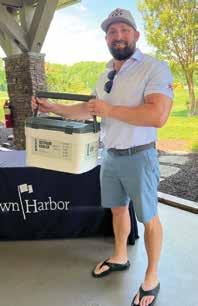
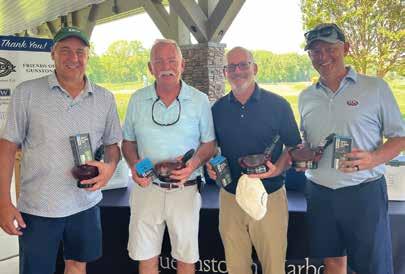
Photography by Marie Thomas, Gunston School.


ShoreRivers Presents Award for Environmental Stewardship
On June 28, Captain Andrew R. McCown was named the 2025 recipient of the ShoreRivers Award for Environmental Stewardship as part of the organization’s annual Solstice Celebration. This annual award recognizes an individual or entity in the Chesapeake Bay watershed for their transformational accomplishments as a steward of the environment. McCown has provided environmental education and astonishment to thousands of students over nearly five decades at Echo Hill Outdoor School and played a pivotal role in forming the Chester River Association in 1986. “[Andrew McCown is] one of the best people I know at connecting people’s hearts to our rivers,” said ShoreRivers’ Executive Director Isabel Hardesty, who fondly noted her own time spent learning from McCown at Echo Hill 30 years ago while presenting the award. “It is because of his unparalleled ability to inspire and connect that he is the recipient of our award this year, and that he is close to all of our hearts at ShoreRivers and for people across the Chesapeake Bay.” Visit shorerivers.org/leadership to learn more about this award and the organization’s impact on the Eastern Shore.

QUEEN ANNE’S CHORALE HONORS D-DAY IN NORMANDY
Each year on the sixth of June, visitors from all over the world gather in Normandy, France, to honor the sacrifices made during the D-Day invasion on that day in 1944. Many special events and wreath laying ceremonies take place to commemorate D-Day and the landing of Allied Forces on its shores during World War ll. Each year the premier All-American D-Day Band and Community Chorus is assembled to perform at some of these commemorative events. The band and chorus are comprised of instrumentalists and singers from across the United States. With their music, they are the American musical ambassadors to France. An invitation to sing in the All-American Community Chorus was sent to a local group, the Queen Anne’s Chorale in Centreville. In addition to this honor, their Artistic Director, Robert Huntington, was chosen to conduct the entire chorus. Fourteen singers, along with family and friends, participated in this memorable trip, where they sang the concert repertoire with an “Americana” theme, which included “Down to the River to Pray,” “The Yellow Rose of Texas,” “Swinging on a Star,” and “Let There Be Peace on Earth.” Learn more about Queen Anne’s Chorale and how to participate by visiting qachorale.org.

SHORE REGIONAL HEALTH NURSES GRADUATE FROM LEADERSHIP INSTITUTE
Three nurse managers at University of Maryland Shore Regional Health (UM SRH), a member organization of University of Maryland Medical System (UMMS), recently graduated from the Nurse Leadership Institute (NLI), a year-long professional development program hosted by the University of Maryland School of Nursing and funded by a state grant. The NLI was designed to build leadership capacity of Maryland nursing faculty and clinicians, facilitate partnerships for developing strategies that shape effective health care, and prepare a nursing workforce to assume roles within systems. Amy Bradley, BSN, manager, 3E and the Joint Center; Mary Collins, BSN, manager, 2E and Dialysis; and Shawne Davis, BSN, manager, Patient Care Services, completed the intensive program along with over 40 other nurse leaders across the state. They are pictured with Danielle Wilson, Senior Vice President and Chief Nursing Officer, and Tisha Thompson, DNP, Senior Director, Emergency Services at the recent graduation ceremony. For more information on the Nurse Leadership Institute, visit umshoreregional.org/nli.

For All Seasons Hosts Hoopers Island Migrant Resource Fair
On June 30, For All Seasons sponsored its third Hoopers Island Migrant Resource Fair at the Volunteer Fire House on Hoopers Island in Fishing Creek, drawing over 127 participants to learn about the agency’s mental health and rape crisis services, and to gather information and items related to regional medical and dental care, health insurance, the Maryland Food Bank, and other key resources. “This gathering has always been a beautiful opportunity to meet new people, and this year was no exception. We had the opportunity to touch many lives, each with its unique circumstances and needs, providing important resources and giving them hope,” shares Ivy Garcia, Director of Latino Outreach and Education at For All Seasons. Learn more about the organization and its resources at forallseasonsinc.org.


Maryland Association for Environmental and Outdoor Education
CELEBRATING 40 YEARS OF ADVOCATING FOR ENVIRONMENTAL LITERACY IN MARYLAND
By Lisa A. Lewis
hen a group of concerned individuals founded the Maryland Association for Environmental and Outdoor Education (MAEOE) in 1985, they embarked on a journey to empower members of Maryland’s communities through environmental literacy. Initiated as a grassroots effort, the nonprofit organization has grown significantly throughout the years—emerging as a leader in this critical movement. As MAEOE commemorates its 40th anniversary this year, it not only celebrates the significant milestones it has achieved but also looks forward to continued growth.
WGuided by its mission to “encourage, engage, and empower [the] community to understand, responsibly use, and promote the natural world,” MAEOE advances environmental education and serves as a catalyst for environmental stewardship. Comprised of a statewide network of partners, the organization cultivates an understanding of environmental issues, promotes problem-solving skills, and encourages community engagement. In short, MAEOE leverages environmental education as the pathway to achieving environmental literacy—enabling individuals to make informed decisions and take action to protect the environment.

“Maryland has a long history of environmental education,” says Laura Johnson Collard, executive director, MAEOE. “By equipping educators, resource managers, environmental program coordinators, students, and others with the knowledge and skills they need to understand the environment, we advocate for a greener, sustainable environment.”
MARYLAND GREEN SCHOOLS PROGRAM
Established in 1999, the Maryland Green Schools (MDGS) program is the signature program of MAEOE. The program, which celebrated its 25th anniversary last year, has expanded to 22 of Maryland’s 23 counties and Baltimore City, including every county except Somerset County. The MDGS program recognizes schools and organizations that connect students to nature and empower them to become environmental stewards.
According to MAEOE, 693 schools in Maryland are currently certified as Green Schools. This figure represents 38 percent of all schools in the state, including both public and private schools. MAEOE has set a goal to certify 50 percent of Maryland’s schools by 2028.
“Green Schools provide engaging and effective instruction by integrating environmental learning across all subjects,” Collard says. “The results are powerful. We see students leading composting programs, conserving energy, joining environmental clubs, and advocating for what is important to them. These stories give us hope. They remind us that when young people are empowered with knowledge and a connection to the world around them, they become the changemakers we need—not just for the future, but right now.”
Becoming a Green School involves a rigorous application process. To maintain award status, schools must reapply every four years. An annual Youth Summit celebrates the achievements of teachers, students, parents, staff, and partners who participate in the program.
“The health of our world is dependent on our future biologists, naturalists, conservationists, environmentalists, and creative thinkers,” says Melissa King, school library media specialist, Flower Hill Elementary School, Montgomery County Public Schools. “Becom-
ing a Maryland Green School and continuing to do the work to maintain status as a Green School is extremely important to our students’ outdoor education experiences and opportunities for hands-on learning. Understanding how their conservation efforts help the Earth is a powerful learning experience.”
Although Maryland has always been a leader in the environmental literacy movement, the state made history in 2011 by becoming the first state in the nation to enact an environmental literacy high school graduation requirement. According to the mandate, every public school in Maryland is required to offer a comprehensive, multidisciplinary environmental education program integrated into the curriculum. This milestone not only underscores Maryland’s commitment to fostering environmentally literate students but also demonstrates its role as a model for other states.
BEHIND THE SCENES AT A GREEN SCHOOL
Flower Hill Elementary School in Gaithersburg is just one of the many Green Schools in Maryland. As part of its curriculum, the school offers numerous opportunities for students to learn about the natural world and participate in hands-on learning activities. King teaches nature-related lessons to her students and leads outdoor projects.
Students take part in a variety of environmental projects, such as creating and maintaining a pollinator garden, performing campus clean-ups, building and monitoring bluebird boxes, and walking to the neighborhood pond for community clean-ups. In addition, King says the second graders grow lettuce in the spring and harvest it in June.
“My desire to learn helps me become a better teacher and offer a variety of experiences to my students,” King says. “It’s so rewarding to see


my students grow. I love seeing them smile as they put their hands into the soil, marvel at the plants, flowers, birds, worms, and insects in our pollinator garden, and go on walking field trips in nature.”
King is the lead teacher for Flower Hill Elementary School’s Green School program. The school’s elementary science curriculum includes environmental education at every grade level.
40TH ANNIVERSARY CELEBRATIONS
Although MAEOE formally commemorated its milestone anniversary during its annual conference in February, the organization will continue the celebration during an open house at its new office location in the Earl Conservation Center, 1212 West Street in Annapolis. The event will take place on September 9 from 5 to 7 p.m. For more information, e-mail communications@maeoe.org.
“The work we do for the environment is so rewarding,” Collard says. “I love hearing from Green School students about what they are doing. Their stories fill me with hope for the future. I also love working with my colleagues throughout the region, the state, and the nation. Our organization is small, but we work with amazing people. We face challenges, but what we do collectively keeps us going every day.”

Meet StudentAthlete Avery McCall
SAINTS PETER & PAUL SENIOR WILL HEAD TO TEMPLE U. ON A SCHOLARSHIP
By Tom Worgo
very McCall possesses all the skills to be an elite lacrosse player—if she is not one already. McCall, a Saints Peter and Paul High School senior, has a great shot, distributes the ball well, and uses her size (5-foot-10) to her advantage. She has above-average quickness, and outstanding leadership skills.
AThose things got the three-sport athlete, who carries a 4.0 weighted grade-point average, an athletic scholarship to Temple University in Philadelphia. Months before college coaches started recruiting her in September of last year, McCall, a midfielder, realized she needed to work on her game. Improving the mental side was crucial.
She put too much of a burden on herself leading up to a game and feeling overwhelmed at times when the action began. This went through her head: McCall had to impress fans, coaches, and opposing players with great games. To her, that meant scoring a lot of goals.
“I was thinking too much,” McCall explains. “The pressure would build up. I would break down (mentally). I also compared myself to others. Then, I learned to stop doing all that. I went into the games without thinking too much. It worked.”
It was just that simple, but it took nearly a year to get there. McCall also made it a priority to improve her strength, quickness, and shot among other things, especially during the school year. She would get up at 4 a.m., go to the gym, and work out for an hour and half, then practice her accurate shot for 30 minutes. “That was all before the school day started,” the Easton resident says.


Saints Peter and Paul Girls Lacrosse Coach Abby Burke adds: “It takes a completely different level of dedication and love for the sport to do that.”
Working on both mental and physical skills took her game to another level. It showed on the field big time in the spring for the Sabres. McCall led the team in goals (35) and assists (20) to become the focal point of the offense. She earned Eastern Shore Interscholastic Athletic Conference (ESIAC) All-League honors for the second consecutive year.
McCall had some fantastic games in 2025. She scored seven goals in a 13-7 victory over visiting Salisbury School and totaled four goals in a 12-9 loss to Baltimore’s St. Timothy’s School. The Sabres needed a big year from McCall after two key offensive players departed the program following the 2024 season. Morgan Quade (playing at Loyola Maryland University) graduated, and Caroline Ewing transferred to St. Mary’s High in Annapolis.
The 17-year-old McCall, who played for the highly-respected United Maryland Lacrosse Club (four years), filled the void quite nicely. “I had to really step it up,” McCall says. “I have never been the most confident player going to the goal. So, I worked on my shot and dodging a lot.”
McCall impressed her teammates and Burke with the season she put together. Burke respects McCall, also a standout soccer player, for leadership qualities as much as her on-the-field production. McCall served as co-captain of the soccer team as a sophomore and the basketball team as well as the lacrosse squad as a junior.
“She is a very natural leader on the field during games and practices,” Burke says. “Her sense of knowing where she should be and where the ball must go is just amazing. It shows the younger players what they should be doing. Everyone on the team really looks up to her.”
McCall was just as important to her team’s success in basketball. She averaged 15.8 points and 11.6 rebounds per game last winter while being named the ESIAC’s Girls Basketball Player of the Year. Her versatility stood out. McCall played point guard along with center.
“She will take up lacrosse in college,” Sabres’ Girls Basketball Coach Katie Murphy says. “If she wasn’t, she would be playing basketball in college. She is that good of a player. There isn’t any team we have played who hasn’t asked, ‘Where is she going to play basketball in college?’ Some coaches say she should play both in college.”

Baltimore Ravens’ RosengartenRoger
THE SECOND-YEAR TACKLE IS READY TO RUMBLE THIS SEASON
By Tom Worgo
oger Rosengarten enjoyed football more than he could ever imagine in 2024, with so many positive things happening. First, with the University of Washington Huskies, then with the Baltimore Ravens.
RAll of his success started when Rosengarten, a 6-foot-5, 316-pound offensive tackle, played in the College Football National Championship game against Michigan, and about two months later, he ran the fastest time by a lineman at the NFL Combine.
It only got better once he got involved with the NFL. The Baltimore Ravens drafted Rosengarten in the second round in April 2024 and a week later, he received a $1.5 million signing bonus with an average annual contract salary of $1.6 million. In the fall, he became the Ravens’ starter at right tackle.

He learned what it was like to play in a pro-style offense. Rosengarten and the Huskies racked up 23 points or more in eight of 13 regular-season games. At the same time, he played with two 2024 first-round picks, quarterback Michael Penix, Jr. and wide receiver Rome Odunze, and third-round pick Ja’Lynn Polk, a wide receiver.
“I JUST HAVE TO STAY FOCUSED. THERE IS NO ROOM FOR ERROR IN THE NFL.”
“I am really looking forward to year two,” Rosengarten says. “I just have to stay focused. There is no room for error in the NFL.”
How good was Rosengarten last year? He beat out Patrick Mekari, a fifth-year veteran in training camp. Mekari had 16 starts between both tackle positions, 13 at center and 17 at guard, in training camp. Rosengarten appeared in 17 games—starting 14—on his way to being named to the Pro Football Writers of America All-Rookie team.
College football prepared Rosengarten well for the NFL. He started 26 games over his final two seasons and earned All-American honors in 2023.
“We had weapons all around,” says the 23-year-old Rosengarten, a native of Colorado. “It was really fun.” What has been the biggest challenge in your two seasons as a Raven? What has really surprised you the most? Being strong mentally throughout a whole season and having that pro mentality mindset. Staying consistent is the thing. The biggest surprise when I first came in last year: You can’t make mistakes. There is no room for error in the NFL. If you have room for error, you are going to get beat or give up a sack. Every step and hand placement has to be done with precision and absolute focus.
Players say going from their first year to their second year is when you can make improvements. Is this due to your off-season training? Absolutely. It is completely different from year one to year two. When you get here as a rookie, you stay in a hotel (for weeks). You aren’t used to it. The little things to the big things. There is so much change in your second year, but it’s good change. What type of training do you do? Everything from A to Z. I do a mix of everything. I want to focus on my whole body, from the ankles up. I do high reps. I am not doing the full-out power thing. Some of the things I do: regular bench press, single-arm bench, split squats, and back squats. I also do cardio, and we are on the field for an hour to two hours. I will push a sled a lot on the field.
Your time in the 40-yard dash at the NFL Combine last year was the fastest of any offensive lineman. How does your speed help you on the field? For me, it’s all about getting off once the play starts. I think a lot of analysts talk about the 10-yard split. I think I had a good one. I can get out in space, and we like to pull our tackles quite a bit. The quicker you can get on the defense, the quicker they will be on their heels.
The starting job wasn’t handed to you in training camp last year. You had to battle to win the job. Can you talk about that? That’s the way it’s been my whole life. My father and mother always told me that nothing is going to be given to you. You always have to earn your spot. I always tell myself I am going to compete and be the best offensive tackle on the field. That’s the mentality I have.
Have you been taking snaps at left tackle, which is a very important position, over the past two years? Do you think you can play the position at a high level if called upon? Being able to play both tackle positions is a rare commodity. I was taking left tackle repetitions last year. I will be comfortable wherever they put me. I can play guard if they want me to. We ended up signing (left tackle) Ronnie Stanley (in March). It feels good to be on the side where I started last season, and having a dynamic duo with the tackle play.
It’s hard thinking about the Ravens and not bringing up Head Coach John Harbaugh, who is going into his 18th season. How would you describe your relationship to him? We have a great relationship. Coach Harbaugh is always going to be the first one on the field. For games, he wants to be nitty, gritty on the details. That’s a great thing to have in a head coach. He is very detail-oriented, and I can’t say enough good things about him.
Before joining the Ravens, you had a great college career at Washington. What was it like playing in the College Football National Championship game against Michigan? What were the highlights? It’s definitely a once-in-a-lifetime opportunity. We didn’t get the result we wanted, and I didn’t play the way I wanted. Looking back at the season, I know I can lay my head on a pillow and say I gave everything I had. That has been my mentality. We can say we were one of college football’s best teams. That is exciting.



An iconic symbol of Maryland’s heritage, diamondback terrapins boast a rich history and play an integral role in the Chesapeake Bay ecosystem. Known for the distinctive diamond-shaped patterns on their shells, terrapins are the only turtle species in North America that live exclusively in brackish water. They thrive in tidal marshes, rivers, and sandy beaches—making the Bay an ideal habitat. Although terrapins spend most of their time in the water, females lay their eggs in sandy areas above the high tide line.
In addition to their close connection to the Bay, diamondback terrapins also serve as a symbol of Maryland’s cultural identity. Not only are they the official state reptile, but Testudo, a diamondback terrapin, is also the mascot of the University of Maryland, College Park. In fact, Maryland celebrates Diamondback Terrapin Day every year on May 13 to pay tribute to this iconic species and raise awareness about its importance to the Bay ecosystem.
But despite their popularity, diamondback terrapins face serious threats. According to the International Union for Conservation of Nature (IUCN), the species is currently listed as vulnerable. So, it’s critical to continue to focus on conservation efforts and implement management strategies to protect them.
“Many of the threats to diamondback terrapins are due to humans,” says Chris Rowe, Ph.D., an associate professor at the University of Maryland Center for Environmental Science (UMCES) Chesapeake Biological Laboratory, who conducts field work at Naval Air Station (NAS) Patuxent River. “Human actions have an impact on terrapins’ environment and their ability to survive. So, it’s important to think about threats from the terrapins’ perspective—not the humans’ perspective—and ask ourselves, ‘What can we do to help?’”
Threats to Diamondback Terrapins

An innovative idea, BRDs, which were developed by turtle conservationists, are rectangular inserts that prevent most terrapins from entering the crab pot, while still trapping blue crabs. According to the DNR, waterfront property owners are legally allowed to crab with a maximum of two recreational crab pots. Commercial crabbers aren’t required to use BRDs.
“IT’S IMPORTANT TO THINK ABOUT THREATS FROM THE TERRAPINS’ PERSPECTIVE— NOT THE HUMANS’ PERSPECTIVE”
According to the Maryland State Archives, diamondback terrapins were once abundant in the Chesapeake Bay and were a popular source of food for colonists. However, historical overfishing, especially during the 18th and 19th centuries, led to serious declines in the population. It wasn’t until 2007 that Maryland banned the commercial harvest of terrapins.
The exact population of diamondback terrapins in the Bay is not known. Scientists say it’s difficult to estimate, and despite localized research, terrapin distribution and abundance are not well understood. But it is clear that the species faces numerous threats to its survival.
Since terrapins are attracted to the same bait as blue crabs, they can become trapped and drown in crab pots. (Like all turtles, terrapins cannot breathe underwater.) To reduce bycatch among recreational crabbers, the Maryland Department of Natural Resources (DNR) implemented a regulation in 1999 that requires all waterfront property owners to equip each entrance funnel of their crab pots with Bycatch Reduction Devices (BRDs), also known as Turtle Excluder Devices (TEDs).
Willem Roosenburg, Ph.D., professor emeritus, Ohio University, who grew up in Maryland and refers to it as his home state, says crab pots are an immediate threat to terrapins.
“While BRDs are effective, there is no way to ensure compliance,” Roosenburg says. “So, we don’t know how many recreational crabbers are actually using them. BRDs can be an important tool to help terrapins survive and live a long life. But compliance remains a significant concern.”
Habitat loss is also a major threat to diamondback terrapins. The brackish marshes and sandy beaches that they rely on for survival are being lost due to erosion. Although bulkheads and riprap are used to harden shorelines and prevent erosion, these man-made structures negatively impact the environment and can result in the loss of vital habitat for terrapins. Living shorelines offer a natural alternative to address erosion and are beneficial to the environment.
The loss of sandy beaches is a significant concern since females use these areas for nesting habitat. Terrapins mate in the water in early spring. Females come onto the beach and dig a shallow nest in the sand during late spring and summer. They lay 10 to 15 eggs and may lay several clutches during the breeding season. The eggs hatch in 60 to 100 days.
“Hardened shorelines present barriers to the movement of terrapins between the water and their nesting sites on land,” Rowe says. “Erecting a bulkhead or riprap shoreline destroys the natural land-water interface and physically isolates potential nesting sites where female terrapins cannot reach them. Living shorelines preserve the natural continuity between land and water that terrapins require.”
In addition to the loss of much-needed sandy beach habitat for use as nesting sites, nest predation is also a threat to terrapins. Foxes, raccoons, snakes, and other animals eat terrapin eggs, resulting in a high offspring mortality rate. Rowe says placing protective cages, typically made of wire mesh, around the nests can protect the eggs from predators.
“Nest and hatchling survivorship is very low among diamondback terrapins,” Roosenburg says. “To maintain the population, it’s critical to ensure that adults have high survival rates. If terrapins survive their younger years, they can live for long periods of time.”
And, of course, climate change is an ongoing threat with potentially serious consequences, including increased habitat loss due to sea level rise and changes in sex ratios among hatchlings due to warming temperatures. Reproduction of diamondback terrapins, like most turtle species, depends on temperature, a process known as temperature-dependent sex determination (TSD). More specifically, the incubation temperature of the eggs determines the sex of the hatchlings. Lower temperatures result in male hatchlings, while higher temperatures produce females.

“Climate change can have a major impact on terrapins—leading to difficulties with reproduction, a higher proportion of females, and potential population decline,” Rowe explains. “Cooler incubation temperatures, which can be achieved by shading terrapin nests, may produce a higher proportion of male hatchlings.”
Additional threats to terrapins include road mortalities, especially among females crossing the road to seek nesting sites, and boat strikes, which can cause serious injury or death. Drivers and boaters should stay alert to protect terrapins from harm.
Since diamondback terrapins face several threats to their survival, large-scale restoration projects, educational programs, and citizen science programs are critical. The following is a snapshot of a few conservation efforts that help protect terrapins and demonstrate Maryland’s commitment to its beloved state reptile.

Living Shoreline Construction
Launched in 2021, the Hog Point Living Shoreline Project will not only protect Navy test and training operations but also diamondback terrapin nesting habitat. The project, which involves the design and restoration of six key shoreline reaches, will protect 4,870 linear feet of coast adjacent to NAS Patuxent River.
A partnership between the NAS Patuxent River Environmental Division, the Naval Air Warfare Center Aircraft Division (NAWCAD) Sustainability Office, the Middle Chesapeake Sentinel Landscape, Southern Maryland Resource Conservation and Development (RC&D), UMCES Chesapeake Biological Laboratory, and many others, construction of the $6.36 million project began in January 2025.
According to the project partners, the shoreline in this area has been receding at an alarming rate of seven to 11 feet per year—with some stretches losing up to 90 feet. In less than a decade, more than 2.5 acres of land and vital marsh habitat have disappeared. Without intervention, more land could be lost in the next 10 to 20 years.
“Rock breakwaters, marsh sills, sand fill, and native marsh grasses are being used not only as the best engineering option to buffer wave energy and halt erosion at the site but also to rebuild coastal habitats and restore ecological function,” says Jessica McGlinsey, a Ph.D. student who studies diamondback terrapins at UMCES Chesapeake Biological Laboratory. “For over a decade, researchers have documented terrapin nesting on this shoreline, and the [project] design was [prioritized] to ensure continued access to nesting habitat. With more than 80 percent of the Chesapeake Bay’s shoreline already altered by human activity, preserving what remains is vital.”
The project was funded by the Readiness and Environmental Protection Integration (REPI) project, Navy Conservation support, and a grant from the National Fish and Wildlife Foundation (NFWF).


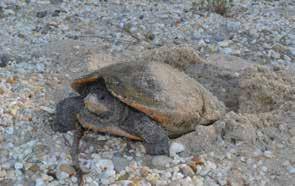
Terrapin Education and Research Partnership
Diamondback terrapins play a vital role in educational programs in Maryland classrooms and offer hands-on learning opportunities for students. The programs, which are part of the Terrapin Education and Research Partnership (TERP), allow students to care for the terrapins, observe their behavior, collect growth data, and research the species’ natural history and its connection to the Bay. Maryland Environmental Service (MES), on behalf of the Maryland Department of Transportation Maryland Port Administration, partners with local organizations and schools to place the hatchlings in classrooms.
Each fall, hatchlings are gathered from Poplar Island and provided to Maryland schools, where they stay until late April or early May. In the spring, students take a field trip to Poplar Island to release the terrapins back into their natural habitat—bringing the experience full circle.
Poplar Island is a unique 1,750-acre restoration project located off Tilghman Island. The island is an ideal terrapin nesting site due to its lack of land predators, its sandy shorelines, and its variety of habitats. A method known as mark and recapture monitors the terrapins after they are released. This process involves marking them with a tag, releasing them, and capturing them at a later date. If a terrapin from one of the classrooms is recaptured, it can be scanned and identified. Roosenburg says mark and recapture is the best tool to study terrapin population. TERP is part of an ongoing research study conducted by Roosenburg, who has engaged in field work in Maryland since 1987 and monitored terrapins on Poplar Island since 2002. His study seeks to determine whether head-starting gives terrapins a higher chance of surviving in the wild.

“Raising terrapins in the classrooms gives them a ‘head start’ before they are released into the wild,” Roosenburg says. “This conservation strategy helps them avoid predation or other threats they may encounter during the early stages of life when they are most vulnerable. TERP can help us determine if head-starting is an effective way to conserve terrapins.”
According to MES, Poplar Island terrapins are raised and released through various programs operating under the umbrella of TERP, including the National Aquarium’s Terrapins in the Classroom program, which provides terrapins to 30 schools, and Arlington Echo’s Terrapin Connection program, which serves Anne Arundel County Public Schools. In addition, MES facilitates TERP for some schools on the Eastern Shore.
“As a scientist who loves the Chesapeake Bay, working on Poplar Island and with TERP has been one of the most rewarding experiences of my life,” Roosenburg says. “When I see students who participated in the program, they always tell me how cool it was and how much they enjoyed it. I’m proud of the work we’re doing, and I hope it has an impact not only on the students but also on future generations.”


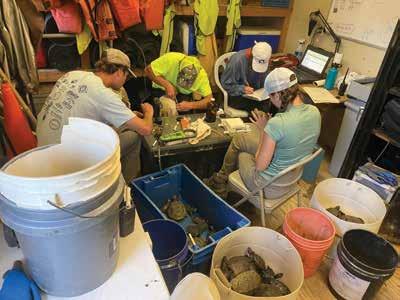
Diamondback Terrapin Surveys
The need for coordinated terrapin surveys was first identified by concerned individuals from across the state with a common goal: to gain a better understanding of terrapins and protect the species. Surveys during the peak breeding season (late May through early June) to estimate terrapin presence and distribution throughout Maryland were initiated in 2012. Participants used a tally sheet to record observations, and the process evolved over time.
“Our surveys were initially carried out by interns,” says Sandi Smith, outreach and marketing coordinator, Maryland Coastal Bays Program (MCBP). “Recognizing the broader value of the effort, the program soon transitioned the surveys into a citizen science initiative. This shift not only expanded data collection efforts but also created valuable opportunities to engage and educate the public about the importance of diamondback terrapins and the challenges they face.”
Since the results of the surveys were often random and inconsistent, a new program is currently under development that will standardize terrapin surveying throughout the Mid-Atlantic.
The Delaware Center for the Inland Bays is the lead on this major effort, which will hopefully launch in 2026. The nonprofit organization has been working with Mid-Atlantic terrapin groups to streamline the process. This year, only land-based surveys will be conducted. Since the sites are limited, Smith says MCBP will not promote surveys this year, but they are looking forward to a bigger and better program next year, which will be land- and water-based.
In addition, MCBP launched a nest protection program last year, which offers opportunities for volunteers to build cages to provide to the community to protect terrapin nests.
“Working with the Maryland Department of Natural Resources Wildlife & Heritage Service, we connected with a group in New Jersey that developed a program that offered protection cages to place around terrapin nests,” Smith explains. “We have mirrored that program, thanks to material donations and volunteers from Home Depot. And we have cages available for anyone who has seen a terrapin laying eggs and would like to protect the nest.”
Looking Forward
Rowe says the future of the Chesapeake Bay’s diamondback terrapins will be challenging, given the current threats and the changes that are occurring to the climate. Thus, community engagement remains critical to help protect this beloved state reptile for future generations.
“ IF PEOPLE MAKE CHOICES THAT ARE CONSIDERATE OF THE HEALTH OF THE BAY, TERRAPINS WILL BENEFIT AS WELL.”
To learn more about MCBP’s terrapin programs, contact Smith at sandis@mdcoastalbays.org.


“Ongoing issues, such as anthropogenic [environmental change caused by humans] habitat destruction and bycatch in crab pots will be exacerbated by rising sea levels and warmer temperatures,” Rowe suggests. “Despite this, it’s unlikely that the Bay’s terrapins will disappear in the near term. But they are [likely] to become less abundant in their distribution as they cling to what high-quality habitat remains. Terrapins are just one part of the Bay ecosystem. If people make choices that are considerate of the health of the Bay, terrapins will benefit as well.”

Special thanks to Chris Rowe, Ph.D., the University of Maryland Center for Environmental Science (UMCES) Chesapeake Biological Laboratory; Willem Roosenburg, Ph.D., professor emeritus, Ohio University; and the Maryland Coastal Bays Program for providing the photographs for this article.




O OLVISITATIONGU I D E
HCS

Our fall overview of open hOuse dates and hOw tO handle preschoOl, grade schOol, and cOllege visits!
Researching and touring schools or universities may be transformative experiences for both parents and students. Meeting the administrations of possible schools, getting firsthand knowledge, and using on-site optics are all crucial stages in selecting the best school, one of the most significant decisions in life. In addition to a thorough list of regional schools, universities, and learning centers that offer open houses, campus tours, online seminars, and programs for students of all ages, this directory offers advice on how to conduct a successful school search.
if yOu’re cOnsidering schOol visitations this fall, or in the near future, here are several tips and cOnsideratiOns when planning.

1. Map out all of the schools and make a list. Make a list of all the possible schools, conduct some research on them, and then select a few before the application process starts. When your selection has been narrowed down to the best candidates, it’s time to begin organizing your campus visits. Plan ahead and map out each school you are seriously considering because you should ideally visit them all.
2. Order is important. Make an effort to visit your top school or schools last. You’ll start to have a clearer understanding of your preferences as you visit additional campuses. By the end of the process, you will have a better idea of what to look for and what questions to ask about the campus you wish to tour.
3. Timing matters. Plan your visit while school is, hopefully, in session. Observing student life will give you an authentic view of the school and will (hopefully) help you envision yourself as a student there.
4. Make extra time to explore on your own. Make sure you take extra time to explore areas of campus that were not covered in your trip because the official campus tour will showcase the school’s best characteristics. This is the ideal time to sit in on a class or lecture, observe students, or visit any departments that interest you.
5. Talk to current students and staff. Your tour guide may be a biased source because it is their responsibility to present the best possible image of their school. Your guide’s knowledge is important, but you might wish to speak with existing students to get a more honest impression. If the tour didn’t cover anything, ask the students: What is life like for students? Is meeting people and forming friendships easy? On campus, is there a lot of diversity? Are you having trouble adjusting?
6. Document every visit. If you plan to visit several schools, make sure to document each visit. Take pictures, jot down some notes, or record a voice memo to highlight your favorite—or least favorite—aspects of each school. Going on several tours within a short period of time can be chaotic, so this will help you separate and compare each visit.
7. Keep an open mind. Your priorities during your initial school search may completely shift once you start touring, so remain open minded. Walk onto every campus with a positive attitude and save your judgments until the end of the tour.
8. Shadow Days. Shadow days provide prospective students with a firsthand experience of a school’s daily life—academics, social dynamics, and campus culture—helping them make informed decisions, ease transition anxiety, and determine if the environment is the right fit for their personal and educational goals.
If you’re considering daycare options for your youngest ones, please see our Daycare 101 primer at the end of this guide for tips and best practices when prospecting potential daycare centers and professionals.
Regional educational institutions, learning centers, and schools that advertise in the What’s Up? Media family of publications are listed below. For program availability, visitation instructions, and open house dates, please think about giving them a call directly. The listing of schools is alphabetical.
Annapolis Area Christian School Lower School Annapolis Campus – 710 Ridgely Avenue, Annapolis; 410-8463504; aacsonline.org; October 2 and November 14, 9 a.m. to 10:30 a.m. Lower School Severn Campus – 61 Gambrills Road, Severn; October 8 and November 5, 9 a.m. to 10:30 a.m. Middle School – 109 Burns Crossing Road, Severn; October 16 and November 20, 7 p.m. to 8:30 p.m. Upper School – 109 Burns Crossing Road, Severn; October 27 and November 17, 9 a.m. to 12 p.m. K-12 Evening Information Nights – 109 Burns Crossing Road, Severn; Inside the Kerr Center; September 18, and April 23, 7 p.m. to 8:30 p.m.
Anne Arundel Community College
101 College Parkway, Arnold; 410-7772222; aacc.edu; October 8, 5 to 7 p.m.
Archbishop Spalding High School 8080 New Cut Road, Severn; 410-9699105; archbishopspalding.org; October 26, 10:30 a.m. to 2:30 p.m., sign-ups are available online.
Benedictine School
14299 Benedictine Lane, Ridgely; 410634-2112; benschool.org; Contact school directly for guidance on visitations, tours, etc.
Boys’ Latin School of Maryland
822 West Lake Avenue, Baltimore; 410377-5192; boyslatinmd.org; September 28, 10 a.m. to 1 p.m.
Calvert Hall College High School 8102 La Salle Road, Baltimore; 410-8254266; calverthall.com; November 8, 10 a.m. to 1 p.m.
Chesapeake College/Eastern Shore Higher Education Center 1000 College Circle, Wye Mills; 410-8225400; chesapeake.edu; Contact school directly for guidance on visitations, tours, etc.
Critchlow Adkins
Children’s Centers
15 S Hanson St, Easton; 410-822-8061; cacckids.org; Contact school directly for guidance on visitations, tours, etc.
Divine Mercy Academy
8513 St. Jane Drive, Pasadena; 410-7050778; divinemercy.md; November 5, 6:30 p.m.; February 4, 10 a.m.
Elizabeth Seton High School 5715 Emerson St, Bladensburg; 301864-4532; setonhs.org; Open House –November 2, 11 a.m. to 2 p.m.; Prospective parent night – October 8, 6:30 p.m. to 8 p.m.
Holy Trinity: An Episcopal School Primary – 13106 Annapolis Road, Bowie; 301-262-5355; The Daisy Lane School & High School Prep – 11902 Daisy Lane, Glenn Dale; 301-464-3215; htrinity.org; October 16, November 11, February 5, April 9, 9:30 a.m. to 11:30 a.m.
Indian Creek School
1130 Anne Chambers Way, Crownsville; 410-923-3660; indiancreekschool.org; Lower School – November 13, 9 a.m. to 10:30 a.m. Middle School – November 20, 9 a.m. to 10:30 a.m. Upper School –November 6, 6 p.m. to 7:30 p.m.
Johns Hopkins Peabody Preparatory
1 East Mount Vernon Place, Baltimore; 667-208-6500; peabody.jhu.edu; Contact school directly for guidance on visitations, tours, etc.
Kent School
6788 Wilkins Lane, Chestertown; 410778-4100; kentschool.org; Grades K-8; October 21, 1:30 p.m. to 3:15 p.m.
Key School
534 Hillsmere Drive; 410-263-9231; keyschool.org; 2.5 years to Kindergarten: November 9, 9 a.m. to 10:30 a.m. Grades 1–4: October 8, 9 a.m. to 10:30 a.m. Grades 5–8: October 22, 1:30 p.m. to 3:30 p.m. Grades 9–12: October 24, 6:30 p.m. to 7:30 p.m. and October 29, 1:30 p.m. to 3:30 p.m.
Lighthouse Christian Academy
931 Love Point Rd, Stevensville; 410643-3034; lcacademy.org; September 5, December 17, January 14, February 11, March 11, April 15, Times TBD.
McDonogh School
8600 McDonogh Road, Owings Mills; 410-363-0600; mcdonogh.org; All open houses run from 9:15 a.m. to 10:45 a.m. Lower School – September 16 and 25, October 3, 7, 16, and 21, November 4, 11, and 18, December 3. Middle School – September 17 and 24, October 1, 8, 15, and 22, November 5, 7, 14 and 19, December 2. Upper School – September 18, 26 and 30, October 9, 14, 17 and 23, November 6, 10, 13 and 20, December 4.
Monsignor Slade Catholic School
120 Dorsey Road, Glen Burnie; 410-7667130; msladeschool.com; Contact school directly for guidance on visitations, tours, etc.
Montessori International Children’s House
1641 N. Winchester Road, Annapolis; 410757-7789; montessoriinternational.org; Tours are held on Wednesday mornings by appointment only.
Naval Academy Primary School 74 Greenbury Point Road, Annapolis; 410-757-3090; napschool.org; November 9, 1 p.m. to 3 p.m.
Oldfields School
1500 Glencoe Road, Sparks; 410-4724800; oldfieldsschool.org; Contact school directly for guidance on visitations, tours, etc. In-person tours will last 1 hour, with online virtual 15-minute tours available online.
Peak Academic Solutions
806 Parkwood Ave, Annapolis; 410934-7567; peakacademicsolutions.com; Contact directly for online tutoring and academic coaching.
Radcliffe Creek School
201 Talbot Boulevard, Chestertown; 410-778-8150; radcliffecreekschool.org; Contact school to schedule an in-person tour. A virtual tour is available on the school website.
Rockbridge Academy
680 Evergreen Road, Crownsville; 410923-1171; rockbridge.org; All Grades – October 6, 9 a.m. to 11 a.m. Junior Kindergarten and Kindergarten – October 17, 9 a.m. to 11 a.m. Preview Night (open to all prospective families) – November 7, 7 p.m. to 9 p.m.
St. Andrews Day School
4 B Wallace Manor Road, Edgewater; 410-266-0952; school.standrewsum.org; November 13, 10 a.m. to 12 p.m.
St. Anne’s School of Annapolis
3112 Arundel on the Bay Road, Annapolis; 410-263-8650; stannesschool.org; November 11, 9 a.m.
St. John the Evangelist Catholic School
669 Ritchie Highway, Severna Park; 410647-2283; stjohnspschool.org; October 7 with advance registration being required. Please contact lfish@stjohnsp.org for in person tours. A seven minute online virtual tour is offered on the school website.
St. Margaret’s Day School
1605 Pleasant Plains Road, Annapolis; 410-757-2333; stmargaretsdayschool. org; October 14, 9:30 a.m.
St. Martin’s in the Field Episcopal School
375 A Benfield Road, Severna Park; 410647-7055; stmartinsmd.org; October 15, January 14, 10 a.m. to 12 p.m.
St. Martin’s Lutheran School
1120 Spa Road, Annapolis; 410-263-4723; stmartinsonline.org; January 23, February 20, 9 a.m. to 2:30 p.m. March 13, 9 a.m. to 1 p.m.
St. Mary’s Annapolis
109 Duke of Gloucester Street, Annapolis; 410-263-2869; stmarysannapolis. org; Elementary (Pre-K through Grade 8) – October 24, 9 a.m. High School –October 25, 9 a.m. Athletic Open House (Pascal Field) – October 28, 6 p.m. to 8 p.m.
Sts. Peter and Paul High School High School – 1212 S. Washington Street, Easton; 410-822-2275; hs.ssppeaston. org; October 26, 12 p.m. to 2 p.m. Elementary School – 900 High Street, Easton – Contact school directly for guidance on visitations, tours, etc.
St. Vincent Pallotti High School
113 St. Mary’s Place, Laurel; 301-7253288; pallottihs.org; Lady Panther Pink Out Admissions Event – October 20, 7 p.m. to 9 p.m. Open House – November 2, 2 p.m. to 5 p.m. Arts, Sciences & Learning Center Open House – December 2, 6 p.m. to 8 p.m.
Salisbury University
1101 Camden Ave, Salisbury; 410-5436161; salisbury.edu; Contact school directly for guidance on individual tours. Group tours of up to 80 students can be booked online and are offered Tuesday, Wednesday and Thursday from 10:30 a.m. to 12 p.m.; Virtual 360 degree and student-guided tours are offered online on the school website.
School of the Incarnation
2601 Symphony Ln, Gambrills; 410519-2285; schooloftheincarnation.org; November 11, January 24, 8:30 a.m. to 11 a.m. Tours are provided, with no appointment needed, every Tuesday from 9:00 a.m. to 11 a.m.
Severn School
Lower School – Chesapeake Campus: 1185 Baltimore Annapolis Boulevard, Arnold; 410-862-3684; severnschool. com; October 1, 9 a.m. Middle and Upper School – Teel Campus: 201 Water Street, Severna Park; October 23, 7 p.m.
The Calverton School
300 Calverton School Rd, Huntingtown; 410-535-0216; calvertonschool.org; Contact school directly for guidance on visitations, tours, etc.
The Children’s Center
2500 Mitchellville Road, Bowie; 301-2497702; thechildrenscentre.com; Contact directly to schedule an in-person tour.
The Country School
716 Goldsborough Street, Easton; 410822-1935; countryschool.org; October 14, 6 p.m.
The Gunston School
911 Gunston Road, Centreville; 410-7580620; gunston.org; October 19, 11 a.m. to 12:30 p.m. and 1 p.m., to 2:30 p.m., November 9, 11 a.m. to 12:30 p.m.
The Summit School
664 E. Central Avenue, Davidsonville; 410-798-0005; thesummitschool.org; October 9, November 18, December 15, February 6, 9 to 10:30 a.m.
University of Maryland College Park
7999 Regents Dr, College Park; 301-3148385; umd.edu; October 2025, Time and Specific Date TBD.
University of Maryland
Eastern Shore
30665 Student Services Center, Princess Anne; 410-651-7747; wwwcp.umes.edu; Contact school directly for guidance on visitations, tours, etc. Tours can be taken in a large group setting or a more exclusive student-family setting.
Washington College
300 Washington Avenue, Chestertown; 410-778-2800; washcoll.edu; Open House – November 8, 9:30 a.m. to 1:30 p.m. Fall Fridays – September 26, October 3 and 24, November 14, 9:30 a.m. to 3:30 p.m.
Wye River Upper School
316 S. Commerce Street, Centreville; 410-758-2922; wyeriverupperschool. org; Open House – October 22, January 22 and March 26, 8:30 a.m. Virtual Open House – November 6, December 4, 12 p.m. Community Open House –November 5, 10 a.m. to 12 p.m.


daycare 101
a primer fOr vetting options; key factors every parent should cOnsider

Selecting the right daycare for your young child is one of the most important decisions you’ll make as a parent. It’s not just about finding a safe place for your child to spend their day—it’s about ensuring their emotional, social, and cognitive development is nurtured while you balance your own work or personal commitments. The decision can be overwhelming, given the range of options available, but understanding what factors to prioritize can help you make the best choice for both you and your child.
1. SAFETY AND HEALTH STANDARDS
The most important consideration when choosing daycare is to ensure that the environment is safe and healthy. Parents should look for: Licensing and Accreditation: Make sure the daycare center is licensed by the relevant local or state agencies. Accredited centers often adhere to more stringent guidelines, including staff training, child-tocaregiver ratios, and safety protocols. Cleanliness and Sanitation: Ask about the center’s cleaning routines, particularly how often toys, play areas, and common surfaces are sanitized. A daycare with a strong focus on cleanliness helps reduce the spread of germs, which is especially important for younger children who are more susceptible to illness. Safety Measures: Check for childproofing, security systems (e.g., locked doors, ID checks for drop-offs), and emergency plans in place. This ensures your child is not only comfortable but also protected in case of emergencies.
2. CHILD-CAREGIVER RATIOS AND GROUP SIZES
Every daycare center has a specific childto-caregiver ratio, which directly impacts the amount of attention and supervision your child will receive. Lower ratios are typically better, as they ensure your child gets the individual attention and support they need. Regulatory Ratios: Check the state or local guidelines for the required child-to-caregiver ratio. This varies by age group, but for infants, it’s typically 1 caregiver for every 3–4 children, and for toddlers, the ratio might go up to 1 for every 6–8 children. Group Size: Smaller groups tend to lead to more personalized care, and your child is more likely to bond with their caregiver. You want to ensure that your child’s needs are met and that they can develop a strong relationship with their caregivers.
3. QUALIFIED AND CARING STAFF
The quality of daycare staff plays a huge role in the environment your child will experience. Look for the following when evaluating daycare staff: Staff Training and Qualifications: Ideally, daycare providers should have relevant qualifications, such as certifications in early childhood education, CPR, and first aid. Additionally, ongoing training in child development, behavior management, and even nutrition is a good sign that the daycare is committed to providing high-quality care. Staff Turnover: High staff turnover can indicate problems with workplace culture or inadequate training, which can disrupt the continuity of care for your child. Consistent caregivers are key for building trust and emotional security in your child. Caregiver Attitude: During your visit, observe the caregivers’ interactions with children. Are they warm, attentive, and engaged? Do they communicate with children at their level, offering comfort when needed or guiding behavior with patience? This is an important factor in assessing the overall atmosphere.
4. CURRICULUM AND DEVELOPMENTAL ACTIVITIES
The first five years of a child’s life are crucial for their development. A good daycare will offer more than just care—it will provide an environment conducive to learning and growth. Look for: AgeAppropriate Learning: While infants might not need an elaborate curriculum, toddlers and preschoolers benefit from play-based learning that supports their social, emotional, cognitive, and motor skills. Ask about daily activities like reading time, outdoor play, creative arts, and educational games. Structured Routine: Children thrive on routine, as it provides a sense of security and helps them understand expectations. Check if the daycare has a consistent daily schedule, including time for meals, naps, play, and learning. Personalized Attention: Every child develops at their own pace. A good daycare provider will understand the individual needs and abilities of each child and adjust activities accordingly, whether it’s for advanced learners or children needing extra support.
6. COST AND VALUE
Childcare can be a significant expense, but the most expensive option is not always the best choice. When evaluating cost, consider the following: Cost vs. Quality: The cheapest option may not always provide the best quality care, and the most expensive one may not necessarily offer better care either. Weigh the cost against the level of care, staff qualifications, and overall experience your child will receive. Additional Fees: Be sure to ask about any hidden fees, such as registration, late pickup, field trips, or special programs. This will help you get a clearer picture of the total cost of childcare. Financial Assistance: Some daycare centers offer sliding scale fees or financial aid, depending on family income. If this is a concern, inquire about possible subsidies or assistance programs.
5. LOCATION AND CONVENIENCE
While the quality of care is paramount, convenience is also a key factor for parents. A daycare that’s convenient for your commute can make your day run more smoothly and reduce stress. Consider: Proximity to Home or Work: Choose a daycare that is either close to your home or your workplace, depending on your daily schedule. If the daycare is far out of your way, you may find yourself rushed or spending too much time commuting, which can add stress to your day. Operating Hours: Does the daycare’s schedule align with your work hours? Some centers may offer extended hours for parents who work late or have unusual schedules. Ensure that the hours are flexible enough to accommodate your family’s needs. Emergency Pickup Policies: Check if there are policies in place for emergency pick-ups in case you’re running late or if your child becomes ill during the day. It’s important to know that someone can be there quickly if necessary.
7. REPUTATION AND REVIEWS
Word-of-mouth and community feedback can offer valuable insights into the quality of daycare centers. Seek recommendations from other parents, and don’t hesitate to read online reviews. Pay attention to:
Word-of-Mouth Recommendations: Talk to other parents in your community about their experiences. If a daycare has consistently positive feedback from parents, it’s a good sign that the center is trustworthy and reliable. Online Reviews and Ratings: Look up reviews on childcare directories, Google, or social media. While reviews should be taken with a grain of salt, patterns of positive or negative feedback can help you make a more informed decision.



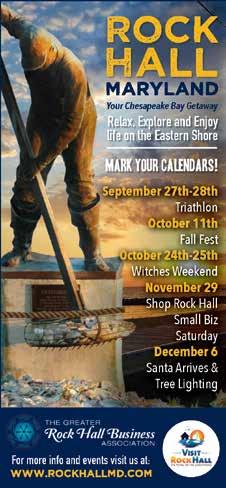





Home & Garden

Photography by Chris Perrini /A Digital Mind

Modern Drama
By Lisa J. Gotto
he homeowners of this thoroughly modern farmhouse-style home had design plans on the table for several years before realizing their official move-in day. The original plan would merely extend the floorplan of their existing mid-sized ranch home on the property to offer more square footage to better accommodate their young, growing family.
TNot being 100-percent sold on the simple scheme, it occurred to the homeowner to show the plans to someone he knew well in the building industry, someone who could help him figure out what was holding him back from proceeding with his design.
“I had been sitting on a set of plans that I had been working on literally over the course of five years, which was basically adding on to my existing brick rancher,” says the homeowner. “And then I showed them to Brent one day,” he adds, referring to his business associate and close friend, Brent Paquin, owner of Paquin Design/Build in Grasonville.
“It just wasn’t going to be a good fit for the property,” the homeowner adds. “And Brent expressed the benefits of going up rather than out.”
Photography by Chris Perrini /A
THE PROJECT: And it was along these lines that the project proceeded. They would scrap an uninspiring rambling ranch floorplan for a more dynamic twostory farmhouse-style home that would not only reflect its idyllic water-side setting but would serve as a reflection of the homeowners’ flair for the dramatic, their love of the natural world, and their desire to optimize the home for total efficiency. (The homeowner is the proprietor of Total Home Performance of Easton, so this residence would represent a model for what home efficiency feels like and how quiet it should be.)
THE PLACE: The homeowner, a native of St. Michael’s, is excited to be raising his young family along the familiar banks of Ray’s Creek, an ideal place for a family that loves and enjoys the outdoors as much as they do. This location would also provide the homeowners with the opportunity to create the ultimate outdoor living area with an in-ground pool, a spacious indoor/ outdoor patio and entertainment area, and an enviable outdoor kitchen that goes way beyond the grill.
EXECUTING THE PLAN: The upgraded plan, explains Paquin, was thoughtfully implemented to enhance the lifestyle of being on the water and leaned into the couple’s desire to connect with the outside world even when they couldn’t be outside.



“When you walk in the front door, you’re looking through the great room to a really big open piece of glass that looks directly out at his pier and his boat,” Paquin says. “They also like to entertain a lot, so we wanted to make sure that the great room and the kitchen and the eating area were nice and large.”
Paquin designed a custom window scheme that incorporated several smaller windows of both orientations to create one large aperture to the water and one wow of a first impression upon walking into the home. This space, now flooded with light, provides the perfect canvas for the living room which the homeowners again chose to infuse with drama and elements of the natural world, where unique woods would play an outstanding role.
For all the floors on the main level, the couple chose a stained Rift and Quarter Sawn White Oak in random lengths. To this they added a dramatic fireplace wall with a substantial piece of black walnut crafted for the mantle. This is juxtaposed with a Graphic Planc tile by Surface Shop which they extended to the ceiling to create a striking accent wall.
“The black walnut is also the countertop material that’s in the entertainment center,” says the homeowner. “That kind of ties those two sides together.”
The floorplan takes off at this point with a breezy transitional space to the kitchen and dining area where a casual conversation zone was created with a pair of comfy, swiveling leather chairs with eyes to the grand gathering space, the outdoor living area, and waterfront.
The enormous kitchen and its center island were originally intended to work in tandem with a long dining table that would run parallel with the room and the island. That vision, upon further examination, the homeowner says, was adapted to create a better sense of flow in the room by turning the table on the perpendicular and adding a cozy and communal integrated bench wall instead.
The couple, who both love to cook, added many bells and whistles to their nearly commercial-grade kitchen that included a 60-inch Wolf gas range and custom hood. Alive with color, the couple chose Shiloh Cabinetry with Hartford
Flat-Panel Door-style in Benjamin Moore’s Pacific Sea Teal, bringing an aspect of the aquatic, indoors.
“I had a lot of fun laying out this kitchen and just thinking about where the spice cabinet would be in relationship to the pots, pans, and utensil cabinets,” explains the homeowner, who adds his wife had much input when it came to the overall aesthetic of the kitchen.
The island was outfitted with a large slab of Cristallo Iceberg Quartzite, and white oak butcher block tops were chosen for the rest of the countertop, along with floating wood shelving for easy access to daily dishware essentials. Three gorgeous brass custom pendant lights were imported from Morocco to provide utility lighting over the island.
The ultimate finishing touch in this room came in the form of a neutral-colored Marazzi Rice backsplash tile that they chose to run the height of the wall to the ceiling. What the homeowner says was a choice made of necessity due to the location of the windows and other wall elements, became a signature unifying aspect of the space, all at once bringing in a sense of warmth and style.

PERFORMANCE & OPTIMIZATION
Perhaps the most interesting aspect of the kitchen, however, is not something you can see or even hear, says the homeowner.
“This is a very high-performing home.”
What that means in terms of the kitchen, is in the noise from the range’s hood fan that you don’t hear because the traditional placement of the motor for the hood was relocated.
“My kitchen exhaust hood is, rather than having the motor right there at the oven, I just put it inline in the duct. “And then my fan motor is 15-feet away from my oven, and it’s up in the attic, so I can’t even hear it, but it works,” the homeowner continues. “I installed a silencer on the duct work, and it all works in harmony so when the kitchen exhaust turns on, it opens the damper to allow fresh air to come in and be immediately drawn back up the range hood and out.”


This work-around, he says, is something any owner can apply to their home in coordination with other measures that can be adapted to traditional HVAC systems to reduce the common noises they produce. Along with managing noise, he says, there are also some great ways that homeowners can ensure their home is as healthy a place to be as it can be.
“This home has a whole-house ventilation system known as an ERV or Energy Recovery Ventilator. So, I have tempered and filtered fresh air that is supplied to every bedroom and common living area in the house, which really helps the house feel fresh, smell good, and maintain good indoor air quality,” explains the homeowner. “And then to regulate humidity, the house is also fitted with two whole-house dehumidifiers, which is something that is commonly overlooked, especially as construction is getting more and more airtight, especially in Maryland, where clearly when it’s hot, it can be humid.”
Addressing noise, optimizing air quality, and improving overall efficiency like this homeowner also did by adding exterior insulation during their build, are layers of performance-related practices available to any homeowner during the building process or that can be applied to an existing home.

STREET SEEN
Last but certainly not least, this home is a stand-out for its remarkable curb appeal. The homeowner conveys that it was absolutely necessary for them to have their home be different and unique in an obvious way, and so they chose to express that desire in color and detail.
“My initial vision was an all-black house, but it had to have natural wood accents,” the homeowner says. For those accents the owner chose solid yellow cedar with a dark oak stain for the home’s posts, gable, and rake board features. Additional natural aspects were reflected in their choice of a Random Ashlar stone veneer in Coyote Gray by Get Real Stone.


The home’s dramatic dark exterior was accomplished with James Hardie Select Cedar Mill board and batten in Midnight Soot. Complementary roof shingles by Landmark’s Pro Certaineed line in Moire Black, and Pac-Clad metal roofing in Matte Black completed the façade presentation. The couple matched the wow factor of the front of their home with an amazing rustic resort approach to outdoor living around the back of their home. Maximized for nearly year-round utility, the home opens from the kitchen and dining area to an expansive screened-in porch.



This airy transitional space provides cover from summer showers and bugs and has a casual publike vibe with its crisp Bluestone pavers, yellow cedar ceiling, and cozy beverage bar. This covered, outdoor dining area flows into a covered outdoor living area with an enviable outdoor fireplace with a black-tiled insert and surround laid out in an eye-catching herringbone pattern. A custom piece of live-edge cedar wood carved by a local artisan and friend adds that finishing touch to this gracious entertainment and gathering area.
Much thought was put into the entire hardscape of the back of the home to encourage long days spent outside in nature, whether they are in the pool or cooking in their ultimate version of an outdoor kitchen complete with firepit, wet bar, pellet smoker, grill, and a power-burner that comes in handy for boiling up some tasty crab.
Because for this Eastern Shore native and his family, that’s a perfect day well spent along his favorite little creek in St. Michaels.


Fall Home Cozy
OUR FAVORITE FALL INTERIOR ENHANCEMENTS
By Lisa J. Gotto
Feathering fall’s nest is a highlight of the year for many interiors aficiona dos. If this sounds like your lane, we feel you, and we’ve tapped our sources and resources to bring you this inspirational guide to creating an experiential fall home environment that goes well beyond surface-level décor.

FTHROWN OVER
A good book, a fire, and a cozy throw is the quintessential way to spend a fall evening at home. And nothing is more relaxing than wrapping yourself in cuddly faux fur. This one from Pine Cone Hill via Perigold.com is double-sided and double-layered for maximum plushness. It also plays into the trend of layering in varied textures to our interiors, so there is also a balance struck between structure and style.
SEASONAL STRATEGY

Supple Seating
If you’re going to add one pivotal piece of furniture this fall, you’ll want that to be something super comfy to toss your must-have throw onto. This gorgeous Soma leather chair in Cognac from Hydeline is elegant yet comfortable, with its box-style seat cushions and well-defined welts giving it a tailored look, but one that is accommodating for all members of your household.
Nothing says homey and cozy these days more than a delicate floral print, and we loved this one from the Anna Elizabeth line of Greenhouse Fabrics. Homeowners who love to personalize by the season are falling in love with the concept of purchasing the perfect pillow forms for their living areas and then swapping them out seasonally with custom fabric covers. This strategy helps keep any scheme from getting stale and is kinder to the environment than constantly replacing pillows to address seasonal mood enhancements.


AMBER WAVES
Counterbalancing autumn’s softer goods with rich metallic accent pieces in shades of amber and gold are always seasonally inviting. Adding votives that enhance and reflect light, like this Branch Candleholder from Arhaus, creates the warm glow that turns any evening into an autumnally ambient event.

OH MY, GOURD !
People who really love to decorate will tell you that the best thing to happen to the pumpkin was not the carving knife, it was getting creative with its traditional orange rind and using it to explore alternate colors and whimsical patterns. This collection from Ballard Designs grows in shape and scale every autumn offering something fun for every fall home.
Pretty Practicality
Let’s face it, in fall—ash happens. That wood-burning fireplace that you always dreamed of is doing its thing and making your living space ultra-cozy and autumnally atmospheric with its flickering flames. But it’s also creating its fair share of burned wood by-product that needs to be cleaned out regularly. This year blend this useful and gorgeous copper ash keeper in with your other hearth essentials near the fireplace for the convenient storage of ash until it can be removed using its sturdy handle with its carved wooden dowel accent.



Floor Show
Autumn is always rich with color, and this multi-colored beauty is a Strawberry Thief Indigo rug from Ruggable. Not only will it artistically pull this room scheme together, it will endure the seasonal slings and arrows of autumn’s weather, pets, and kids because it is durable and 100-percent washable, so you can fall for the pattern and the style with no wear-and-tear concerns.
THE SUNNY SIDE
For many reasons, we are seeing exceptionally sunny versions of yellow wall treatments making an appearance in many of today’s bestdressed homes. And why not? Even though yellow is probably not the first color you think of because of its association with the taxi cab and the banana, muted, buttery shades of this hue are definitely having a moment because of its warm and comforting aesthetic. This version is called Dayroom Yellow from Farrow & Ball.
Photo credits: Supple Seating, image courtesy of hydeline.com. Thrown over, image courtesy of perigold.com. Seasonal strategy, image courtesy of greenhousefabrics. com. Amber waves, image courtesy of Arhaus. com. Pretty Practicality, image courtesy of plowandhearth.com. Oh my, gourd!, image courtesy of ballardesigns.com. The sunny side, image courtesy of mydomain. com. Floor Show, image courtesy of ruggable.com.


By Lisa J. Gotto
cenic Chestertown is the serene setting for this three-bedroom riverside home that is abundant in charm and loaded with amenities.
S Contemporary Town Living
Gorgeous sunsets over the water are the order of the day for this contemporary, end-of-row townhouse/condo, designed to provide a turn-key lifestyle for its new homeowners.
Upon entry to the home guests are greeted with pretty, honey-colored hardwood floors, an attractive entry hall with built-in upholstered bench seating, and tons of natural light streaming in from the open-plan living room windows at the opposite end of the home.
Primary Structure Built: 2006
Sold For: $965,000
Original List Price: $950,000
Bedrooms: 3
Baths: 3
Full, 1 Half
Living Space: 2,800 Sq. Ft.
Lot Size: n/a



A central hallway with wainscotting detail leads back initially to a lovely den with large, sunny windows offering river and dock-side views, and the home’s first-floor powder room. An attractive staircase highlights the hall along the way to the great room with its attractive kitchen, living, and dining room layout thoughtfully executed to maximize natural light and water views.
The all-white farmhouse-style kitchen is crisp and impeccable with its white subway tile backsplash, gorgeous cabinetry with attractive hardware, and a huge integrated refrigerator. Windows look out over the farmhouse sink to the water, and a large peninsula with gleaming granite counter-
Photography by Patty Hill

tops provides plenty of prep space and acts like a natural border to the bright and sunny dining area. This space provides great views, as well, through its set of French doors to the home’s back porch that faces the town’s park and walking trail.
This space is also outfitted with an attractive bar area with wine fridge and pretty glass-front cabinetry above. The dining area flows effortlessly to the home’s roomy living room with a white-mantled gas fireplace, and is the perfect place to chill, take in the views, or enjoy family movie-time.
The home’s spacious primary bedroom has a separate seating area and is bright and sunny with a wall of large windows to the waterfront and park. Along with a large, walk-in closet and an en suite bath with double vanity, this room also offers access to a lovely, second-floor balcony. This home’s second floor also offers a home office, another bedroom, and a full bath. A third bedroom, located on the home’s third floor, would also make a lovely family room, if needed.
Listing Agent: Tracy Stone, Coldwell Banker Chesapeake Real Estate, 114 Cross St., Chestertown, m. 443480-0610, o. 410-778-0330, tstone@ cbchesapeake.com, coldwellbanker. com Buyers’ Agent: Richard Keaveney, Cross Street Realtors, 210 Cross St., Chestertown, m. 410-7086470, o. 410-778-3779, rdkeaveney@ gmail.com, csrealtors.com


Miles of Tranquil Waterfront
By Lisa J. Gotto
iming was everything for the new homeowners of this outstanding waterfront property in Tilghman. With five acres of land and miles and miles of Bay views from its positioning at the mouth of the Choptank River, this 2,800-square-foot home is a customized, rustic retreat loaded with amenities.
TThe buyers patiently waited for the perfect waterfront property. This one checked all of their boxes, especially the endless view of the Chesapeake Bay and its privacy.
Primary Structure Built: 1998
Sold For:
$1,995,000
Original List Price: $1,995,000
Bedrooms: 3
Baths: 2 Full, 1 Half
Living Space: 2,801 Sq. Ft.
Lot Size: 5.02 acres


Patience pays off, as this residence offers incredible views from the moment you walk inside the two-story, transitional-style home. A charming, timber portico, lantern sconces, and a set of stylish charcoal-colored doors with side-light panels welcome guests to a spacious entry. From here the home leads to an exquisite family room with a two-story wall of windows to the waterfront and rustic wood framing throughout. This space is highlighted with a stone-front feature fireplace wall and rich, gorgeous hardwoods running underfoot here and then transitioning into a main living and dining area.
This entire open-plan space which extends to a modern farmhouse kitchen is awash with natural light from the skylights above and the walls of windows that make up the water-facing dining room.
The kitchen also has a two-story ceiling detail with wood inlay and knotty beams. White walls and all-white cabinetry pair with sleek stainless-steel appliances and stylish nickel hardware for a perfect, polished farmhouse look. A huge center island topped with white stone offers storage, breakfast seating, and an integrated gas top stove.
A screened-in porch extension is located just beyond the dining room, and this entire space opens to the property’s extensive outdoor deck, pool, patio area, and a backyard that leads out to the expansive water playground of the Choptank.
The main level of the home offers two large bedrooms that share a spacious Jack-n-Jill bathroom and offer amenities like wood beams and access to a private, screened-in porch.
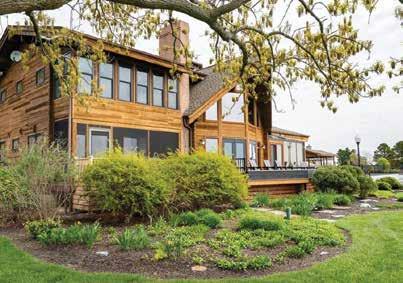
A huge and dreamy owners suite is located on the level above and features gorgeous in-laid wood ceilings with beams, a white shiplap feature wall, and tons of natural light and water views from a series of windows and a skylight. The en suite bath is a spa-like retreat with a soaking tub, separate vanities, gorgeous windows and skylights, and a large, walk-in shower.
Just off the bedroom, the owners have a private sitting room that can be accessed via spiral staircase, which also leads to the home’s cupola/ outlook feature up above.
Along with its amazing pool and patio area, this property features a three-bay garage, a greenhouse, storage for kayaks, and an outdoor shower and restroom, checking every box and then some for this property’s patient new owners.
Listing Agent: Debra Crouch, Benson & Mangold Real Estate, 211 N. Talbot St., St. Michaels, m. 410-9240771, o. 410-745-0415, dcrouch@bensonandmangold. com, bensonandmangold.com Buyers’ Agent: Lona Sue Todd, Taylor Properties, 175 Admiral Cochrane Dr., Annapolis, MD, m. 410-310-0222, o. 410-2247265, lstodd11@outlook.com, taylorprops.com






The most exquisite and compelling projects in residential construction and design!

Health & Beauty

Ancient Grains Are Making a Comeback
By Dylan Roche
ou’ve probably heard the expression “What’s old is new again,” right? What if that applied to food—specifically, ancient grains. They’re about as old as food can get, but now they’re making a comeback as more people recognize their health benefits.
YWhile there’s no strict definition as to the ancientness of these grains, according to the Whole Grains Council, they’re not exactly the same as more modern grains like wheat, oats, and rice, which have been selectively bred and modified through specific cultivation methods over the years, primarily for greater abundance and resistance to disease. Ancient grains are the same today as they would have been hundreds or even thousands of years ago, when they formed the basis of the diets in the regions of the world where they grew.
While modern grains are often processed and refined (think brown rice made into white rice), they’re still widely available in their whole forms. And although these whole modern grains have their nutritional benefits, such as complex carbohydrates for sustained energy, they’re not quite on the same level as ancient grains, which are much more nutrient dense.
How do we define whole? When a grain is whole, it hasn’t been cracked, crushed, or processed, which removes vital parts of the grain—the bran, the germ, and the endosperm. These parts of the grain are the source of the nutrients like fiber and protein.
According to research by Harvard Medical School, people who eat four servings or more of whole grains (whether modern or ancient) every day have a lower risk of dying from heart disease or cancer.

SO, WHICH ANCIENT GRAINS SHOULD YOU BE TRYING? A FEW ANCIENT GRAINS YOU MIGHT’VE HEARD OF (BUT NEVER TRIED BEFORE)…
Amaranth: Once cultivated by the ancient Aztecs, amaranth can be cooked up into a fluffy porridge similar to oatmeal. It’s rich in protein, particularly the amino acid lysine, which is often lacking in plantbased protein sources. Barley: Known for its mildly nutty flavor and chewy texture, barley makes a hearty addition to salads, pilafs, and risottos, and its generous soluble fiber content makes it great for digestive health. Millet: This small-seed grain is cultivated in many parts of Africa. Because of its mild and almost sweet flavor with a hint of buttery-ness, millet works well as a breakfast porridge. It’s rich in magnesium and easier to digest compared with most grains. Quinoa: Although it’s technically a sprout, quinoa cooks up similar to a cereal grain. It has a nutty flavor and slight chewiness, which will give dimension to salads or as a heartier substitute for rice. It’s one of the rare plant foods to provide all nine essential amino acids, making it a complete protein source. Rye: This European grain is similar to wheat and barley, and it’s often used to make bread. It has a distinctive earthy, almost sour flavor with a little bit of tang. Because it’s high in fiber, it’s great for managing blood sugar and cholesterol.
WAYS TO PREPARE WHOLE GRAINS
If you have your doubts, try mixing in an ancient grain with something you already like. Next time you make rice pilaf, replace half your rice with quinoa, or add some barley to your morning oatmeal. Be sure to rinse your grains before cooking. Some of them have a naturally occurring organic compound called saponins that can become foamy when the grains are cooked in water, but a quick rinse in a fine-mesh sieve under cold water will remove it. Give your grains a quick toast in a dry skillet over low heat before you boil them to deepen and enhance their flavor. Swap out the water you cook the grains in with chicken stock or vegetable broth for a more flavorful dish.

What You Should Know About Rucking
By Dylan Roche
n aerobic exercise like walking or running hardly needs any introduction—most of us already know these are good for us. Our heartrate increases, we breathe a little more heavily, and we break a (light or heavy) sweat.
ABut…what if there were a way to make these everyday popular cardio choices a little more intense? That’s the idea behind rucking, and it’s why this modification to your typical cardio session to improve your strength and endurance is a favorite among fitness trainers.
So, if you’re asking yourself, “What is rucking?” we’ve got the answers for you here.
WHY IS RUCKING ALL THE RAGE?
Rucking is the practice of walking or running while wearing a rucksack, or close-fitting weighted backpack. Rucking is often part of boot camps and military training. The Cleveland Clinic calls rucking a full-body workout that will not only raise your
heartrate but also strengthen your muscles more than simple running or walking would. Many fitness influencers on social media—such as David Goggins, a retired Navy Seal and long-distance runner—tout rucking as a crucial part of their training program.
The American Council on Exercise points to the combination of cardio and strength training. Adding weight to a cardio session means you burn more calories, improve your aerobic endurance, and build strength in your lower body and core.
CAN I USE ANY KIND OF WEIGHTED BACKPACK?
Can you? Sure. Putting weights in a backpack is an easy and inexpensive way to test out whether you like rucking. But on a consistent basis, it’s best to use an actual rucksack—rucksacks are designed with special inserts to hold weights close to your body, and they evenly distribute the weight across your body. A backpack with weights in it could put strain on your spine or shoulders, and the weight could bounce around or shift too much.
If you decide to get a rucksack, make sure you proceed with caution. If you’re used to lifting 30 pounds in the gym, you might think you’ll have no problem weighting yourself up with 30 pounds for a walk—but that’s not the case! Rucking 30 or even 20 pounds for an extended period of time is much different from lifting 30 pounds for a few seconds. It’s best to start off with an added 5 pounds and increase your weight a little bit each week.
WHAT SHOULD I CONSIDER WHEN PLANNING MY RUCKING WORKOUTS?
You’ll quickly notice that weight affects how hard your workout is. A run or a walk that’s easy or moderate when you’re unweighted all of a sudden becomes much more intense with a rucksack on. If you’re rucking as part of your workout routine, take care to consider: How heavy your rucksack is? What distance you’ll go? What pace you’ll maintain? How long you’ll run/walk?
Army research shows that when you add 1 percent of your bodyweight, you increase your energy expenditure by approximately (emphasis on approximately) 1 percent. That means if you’re 150 pounds, then 5 pounds is about 3.3 percent of your bodyweight, and when you put on a 5-pound rucksack, you will need to exert 3.3 percent more effort.
You could let yourself slow down about 30 seconds per mile or shorten your distance by about 3 percent and get the same workout you usually do, or you could push yourself to keep the same pace and run the same distance while feeling a little more exerted, which leads to progress. However you approach it, you’ll find your rucksack makes you faster and stronger.

7 Steps for Successful Hair Slugging
By Dylan Roche
lugging may not sound like the most glamorous skincare and haircare hack you’ve ever heard of, but that hasn’t stopped it from becoming popular. It started with a simple approach to nourish dry skin: Apply a thick coat of oil and let it sit to lock in moisture. From there, skin slugging has given way to the popularity of hair slugging, the practice of combatting dry or damaged hair with the same oil treatment. Dermatologists say it’s a safe and effective practice, and it’s one that’s been used around the world for generations.
SSo, if you’re curious about how you can use a simple oil you might already have in your pantry or medicine cabinet at home to achieve softer, smoother, more lively hair, here are seven steps you can adapt to your specific needs:
1. Determine if it’s right for you. Start by deciding whether hair slugging makes sense for your hair, particularly depending on the time of year. If you have course, frizzy, brittle hair, then slugging would help moisturize your strands, especially in the winter months when the air tends to be dryer. But if you have an oily scalp, then slugging could cause a breakout around your hairline, and if you have especially fine hair, you could end up with an oily buildup that is difficult to wash out. (If you do have finer hair and still want to give it a moisturizing boost, pay attention to the next step.)
2. Choose your oil. Not all oils will be the right fit. A heavier oil like coconut oil or olive oil will work well to penetrate the shafts of thicker hair. If you’ve got finer hair, you want to go with a lighter choice like argan oil or grapeseed oil, which won’t weigh your hair down.
3. Prepare your hair. Prepare your hair for slugging by conditioning it and towel drying it (without any applied heat), leaving it slightly damp but not wet.
4. Apply and wrap. Apply the oil to your damp hair but be careful about the amount you use. You want your hair to be generously and evenly coated but not dripping. Once you’ve finished applying it, wrap your hair with a towel or scarf, or you can cover it with a bonnet or shower cap.
5. Let it sit. It’s usually best to slug hair right before you go to sleep, so you can give your hair a full eight hours to lock in moisture.
6. Style as needed. The next morning, take off the wrap and remove any excess oil. This can typically be done with a toweling and brushing, but if there is a lot of leftover oil, you may need a light shampooing. Style your hair afterward the way you usually do.
7. Repeat as needed. You don’t need to (and probably shouldn’t) slug your hair every night. Stick with once a week to begin with. If your hair is very dry, you may need to repeat the process twice a week, and if you find your hair is prone to oiliness, you can cut back to every other week or even once a month.
Food & Dining

by
Photography
Bill Whaley
Tiki Flair Meets Fusion Cuisine
By Tom Worgo
hen a restaurant in Easton that Austin Smale had helped open for a restaurant group went out of business in early 2021, surprisingly to him, he had no idea what to do next. But Smale, who served as the general manager, couldn’t believe what happened next. The owner of the actual building asked him if he wanted to start his own restaurant on these premises—any kind he wanted. “On a handshake deal, he said, ‘Whatever you want to do here, go for it,’ Smale recalls.
WInspired, Smale opened Tiger Lily, a tiki-fusion restaurant, in October of 2021. He was a 30-yearold restaurant owner. Now, he is 34.
“I think it’s rare and incredible,” Tiger Lily Executive Chef Kevin Loza says of Smale’s age. “I am so proud of how far Austin has come.”
Tiger Lily specializes in ethnic, Latin American, South American, and Peruvian food. Smale, an Easton resident, believes Tiger Lily has filled a void that existed in Easton’s bar and restaurant scene, as a casual place with live entertainment and value-priced food. “There was nothing in the market as far as that goes,” Smale says. “It was a home run idea.” We recently sat down with Smale and Loza to discuss Tiger Lily.


TIGER LILY
206 N. Washington Street, Easton • 410-690-4602 • tigerlilyeaston.com
How would you describe Tiger Lily and its menu? We are a tiki-fusion restaurant. We specialize in ethnic cuisine. I love fish. The menu is creative and diverse. We are not just a taco place. We do a lot of Latin American and South American food. On the menu, we also have Peruvian food and an award-winning crab cake—which was judged the best on the Shore.
I also create a bi-weekly features menu. It’s our specials menu. It always has fun things on it. We never do just one style of cuisine. That’s what we love about it: It’s always changing. It’s affordable. It’s what everybody pulls together. It’s a collaboration between myself and the other chefs. The menu allows chefs to express how passionate we are about our food.
What is your best-selling entree? What do customers like about it? Spicy Tuna Poke Bowl. It’s ahi yellow-fin tuna marinated in house-made poke sauce. It’s served with sliced cucumbers, cherry tomatoes, mandolin carrots, seaweed salad, and pickled onions. It is topped with spicy mayonnaise over a cold bed of jasmine rice. It easily transports you to Hawaii. I’ve had customers tell me it’s the best Poke Bowl they’ve ever had.
What else popular? Birria Tacos. They are home-made. Our tortillas are made fresh daily and charred on both sides. We put shredded cheddar cheese on the tortilla. We top it off with our house braised angus brisket. That’s braised in our oven mixed with a marinade, celery, carrots, red peppers, jalapenos, and garlic. We serve it with a side of our consommé sauce, or our dipping sauce. They are savory, crunchy, and warm your soul.
Tell me about some of your food specials? Tiger Lily is a great affordable restaurant for everyone. Every night of the week, we have a special. Monday is burger night. You get an angus double smashed burger with fries for 10 dollars. Tuesday night, street tacos are three dollars. Wednesday night, we have half-price bottles of wine and
six-dollar crushes. Thursday night, we have all-you-can-eat jumbo wings with 11 different flavors. I am trying to reach the family group on Fridays. Kids under 10 eat for free. Parents have to order one entree. Kevin, in your 23 years in the restaurant industry, have you come across an owner quite like Austin? Not a lot of people his age have accomplished the things he has done. Some people have doubted him [because of his age], but I don’t think he gets enough credit for building this business. He is a great boss, a very understanding person, and he will give you the shirt off his back. Austin, where do you source your food from? We get a lot of our seafood from BSA Seafood in Grasonville. They have such a wide variety of products that are of a very high quality like crab meat, halibut, tuna, and flounder. A lot of our produce comes from Teddy Bear Fresh Produce in Easton. All the things they offer are top quality. They provide a better product than others in the area. It’s always fresh and if there is something specific we are looking for, they can find it. Do you feel there has been a lack of casual, beach-like restaurants in the area? The Eastern Shore is a giant attraction for Maryland classic dishes: crab cakes, eating crabs on the deck. A lot of places have that covered, but we can provide more of a fusion experience that you see in beach towns or Annapolis for example. There are not as many creative options to choose from in Easton. We have become that creative option while incorporating some of the Eastern Shore cuisine into our food and keeping it affordable. What changes have you made since opening the restaurant? It seems like you wanted to make the inside bar area very special? The indoor bar [there’s also an outside bar] is something you won’t find anywhere in Easton. We dove into a lot more products for the bar. When you come in the front door, the bar area kind of
SHRIMP TEMPURA SKEWERS
Serves 1 (4 skewers)
Ingredients:
For the Shrimp:
• 8 large (26/30) peeled and deveined Gulf shrimp
• 4 wooden skewers (2 shrimp per skewer)
Dry Dredge:
• 1 quart all-purpose flour
• 1 cup cornstarch
• 4 oz Old Bay seasoning (or to taste)


takes you on vacation. We have fishing nets on the ceiling, Japanese lanterns, and tropical wallpaper surrounding the bar. There’s a really nice display of spirits with a beer tap in the center. It transforms you. It’s like a tiki location. The inside decor is a mural from one of our employees going with the theme of monstera tropical plants.
Why did you bring in longtime friend Kevin as executive chef in March of last year? I knew his set of skills really well as far as creativity, but most importantly his logistical understanding, from ordering to stocking properly. He established a new standard. He is really doing a great job. He is very good at understanding ingredients and costs, which gives him an advantage in that he can create fantastic dishes at a cost-effective level. He does fantastic seafood. We have one of the best crab cakes in Easton.
Wet Batter:
• 1 quart allpurpose flour
• 1 cup cornstarch
• 1 tsp salt
• 1 tsp pepper
• 1.5 to 2 cups club soda (until smooth and pourable)
For the Garnish & Plate:
• Arugula or spring mix (as bed for plating)
• 1 tbsp toasted sesame seeds
• 1 green onion, thinly sliced
Fresno Aioli (Spicy Mayo):
• 1/2 cup mayonnaise
• 1 tbsp Sriracha
• 1 tsp lime juice
• 1 tsp sesame oil
• 1/2 tsp garlic (minced or grated)
Mix together and chill until ready to use.
Teriyaki-Style
Shogun Sauce:
• 1/2 cup soy sauce
• 1/4 cup rice vinegar
• 2 tbsp brown sugar
Simmer in a small saucepan for 3–4 minutes until slightly reduced. Cool before drizzling.
Directions:
Prepare the shrimp: Thread 2 shrimp onto each skewer (4 skewers total). Heat oil in a deep fryer or heavy pot to 350F. Dredge shrimp skewers first in the dry mix, then dip into the wet batter. Fry for 3–4 minutes or until golden brown and crispy. Plate: Lay down a small bed of greens. Arrange shrimp skewers on top. Drizzle with Fresno aioli and teriyaki-style sauce. Finish with toasted sesame seeds and sliced green onion.

Advertisers
Listed in Red
Avg. Entrée Price
$ 0-14
$$ 15-30
$$$ 31 and over

Welcome to your regional dining. We include many restaurants for many tastes and experiences. Don’t see your favorite on the list? Email editor@whatsupmag.com and let us know! And for the full guide, visit whatsupmag.com.
Queen Anne’s County
18Twenty
500 Kent Manor Drive, Stevensville; 410-643-5757; kentislandresort.com/ dining
$$
Reservations
Full bar
Family Friendly
Water View
Outdoor Seating
Live Music
Grab and Go
Amalfi Coast Italian & Wine Bar
401 Love Point Road, Stevensville; 443249-3426; amalficoastki.com $$
Bark Barbecue Café
371 Log Canoe Circle, Stevensville; 443-618-3676; barkbarbecue.com $
Bay Shore
Steam Pot 111 E. Water Street, Centreville; 410-7583933; bayshoresteampot.com $$ Seafood
Big Bats Café
216 St Claire Place, Stevensville; 410604-1120; bigbats. com $$
The Big Owl Tiki Bar and Grill
3015 Kent Narrow Way S, Grasonville; 410-829-9546; thebigowl.com $$ Seasonal
Bridges Restaurant
321 Wells Cove Road, Grasonville; 410-827-0282; bridgesrestaurant.net $$$
Café Sado 205 Tackle Circle, Chester; 410-6041688; cafesado.com $$
Cult Classic Brewing 1169 Shopping Center Road, Stevensville; 410-980-8097; cultclassicbrewing. com $$ Events, Beer
Doc’s Riverside Grille
511 Chesterfield Ave, Centreville; 410-7581707; docsriversidegrille.com $$
Dock House Restaurant
110 Piney Narrows Road, Chester; 443446-4477; Dockhouserestaurant.com
$$$
Fisherman’s Crab Deck
3032 Kent Narrows Way S, Grasonville; 410-827-6666; crabdeck.com $$ Seasonal
Fisherman’s Inn
3116 Main Street, Grasonville; 410-8278807; fishermansinn. com $$$
Frix’s Fire Grill
1533 Postal Road, Chester; 410-6042525; Frixsfiregrill. com $
Harris Crab House and Seafood Restaurant
433 Kent Narrow Way N, Grasonville; 410-827-9500; harriscrabhouse.com
$$
The Jetty Dock Bar and Restaurant 201 Wells Cove Road, Grasonville; 410-827-4959; jettydockbar.com $$
Libbey’s Coastal Kitchen and Bar 357 Pier One Road, Stevensville; 410604-0999; libbeyscoastalkitchen.com $$
Love Point Deli
109 Main Street, Stevensville; 410-6042447; lovepointdeli. com $
Kent Point Marina, Bait House and Seafood
107 Short Road, Stevensville; 410-7532330; kent-point-marina.square.site $$ Seafood
The Kentmorr Beach Bar and Grill 910 Kentmorr Road, Stevensville; 410643-2263; thekentmorr.com $$ Seasonal
Knoxie’s Table 180 Pier One Road, Stevensville; 443249-5777; baybeachclub.com $$
Mamma Mia Italian Bistro and Sports Bar
219 E Water Street, Centreville; 410-7582222; mammamiacentreville.com $$
The Market Gourmet Cafe 180 Pier One Road, Stevensville; 410604-5900; baybeachclub.com $, Locally Sourced
Mr. B’s Seafood Market 114 State Street, Stevensville; 410-6435536; mrbsseafood. com $$ Seafood
The Narrows Restaurant 3023 Kent Narrows Way, Grasonville; 410-827-8113; thenarrowsrestaurant.com $$$
Phat Daddy’s BBQ
205 Spring Avenue, Chestertown; 443282-0028; phatdaddysbbq.com $
Pour House Pub
205 Tackle Circle, Chester; 443-2493242; pourhouseki. com $
Rams Head Shore House
800 Main Street, Stevensville; 410643-2466; ramsheadshorehouse. com $$
Red Eye’s Dock Bar
428 Kent Narrow Way N, Grasonville; 410-304-2072; redeyesdb.com $$ Seasonal
Rolph’s Wharf: The Sandbar
1008 Rolph’s Wharf Road, Chestertown; 410-778-6347; rolphswharfmarina. com $$ Light Fare
Señor Chile
2142 Didonato Drive; Chester, MD 21619; 410-204-9444; senorschile.com
Stevensville Crab Shack
116 Pier One Road, Stevensville; 410604-2722; stevensvillecrabshack.com $$, Seafood
Yo Java Bowl Café 800B Abruzzi Drive, Chester; 410-6040000; yojavabowl. com $
Talbot County
Anthony’s Italian Restaurant 26342 Oxford Road, Oxford; 410-226-1118; anthonyoxford.com $$,
Ava’s Pizzeria & Wine Bar 409 Talbot Street, St. Michaels; 410-7453081; avaspizzeria. com $
Bas Rouge 19 Federal Street, Easton; 410-8221637; basrougeeaston.com $$$
Bistro St. Michaels
403 South Talbot Street, St Michaels; 410-745-9111; bistrostmichaels.com $$$
Blu Miles Seafood and Grill
305 Mulberry Street, St Michaels; 410-7458079; theblumilesrestaurant.com $$
The Blue Crab 102 S Fremont St, St Michaels; 410-7454155; the-blue-crabshop.square.site $ Daily Breakfast
Bombay Tadka 508 Idlewild Ave, Easton; 410-7462135; bombaytadkamd.com $$
Café 401
401 S Talbot Street, St Michaels; 410-7453323; thecafe401. com $$
Capsize
314 Tilghman Street, Oxford; 410-2265900; capsizeoxmd. com $$ Seasonal
Carpenter Street Saloon
113 S Talbot Street, St Michaels; 410-745511; carpenterstreetsaloon.com $
The Coffee Trappe
4016 Main Street, Trappe; 410-4766164; coffeetrappe. com $$, Daily Breakfast
Corah’s Corner
105 N Talbot Street, St Michaels; 410-7458008; corahs.com $$
Crab Claw Restaurant
304 Burns Street, St Michaels; 410-7452900; thecrabclaw. com $$
Doc’s Downtown Grille
14 N Washington Street, Easton; 410822-7700; docsdowntowngrille.com $$
Doc’s Sunset Grille
104 W Pier St, Oxford; 410-226-5550; docssunsetgrille.com $$
Eat Sprout 335 N. Aurora Street, Easton; eatsprout. com $
Eat Sprout
114 S. Talbot Street, St. Michaels; eatsprout.com $
The Fool’s Lantern and Taproom
310 South Talbot Street, St Michaels; 410-888-7379; thefoolslantern.com
$$
Foxy’s Harbor Grille
125 Mulberry Street, St Michaels; 410-7454340; foxysharborgrille.com $$ Seasonal
The Galley
305 South Talbot Street, St Michaels; 410-200-8572; thegalleysaintmichaels. com $$
Gina’s Café 601 Talbot Street, St Michaels; 410-7456400; ginascafemd. com $$
Hot Off the Coals BBQ 8356 Ocean Gateway, Easton; 410820-8500; hotoffthecoals.com $
Hunter’s Tavern 101 East Dover Street, Easton; Tidewaterinn.com; 410-822-4034 $$ Daily Breakfast
Limoncello Italian Restaurant & Wine Bar 200 South Talbot Street, St Michaels; 410-745-3111; limoncellostmichaels.com $$
Lowe’s Wharf 21651 Lowes Wharf Road, Sherwood; 410-745-6684; loweswharf.com/ restaurant $$ Seasonal
Momma Maria’s Mediterranean Bistro and Bar 4021 Main Street, Trappe; 410-4766266; mommamariasbistro.com $$, Daily Breakfast
Osteria Alfredo
210 Marlboro Street, Easton; 410-8229088; osteriaalfredo. com $$,
Out of the Fire 111 South Washington Street, Easton; 410205-2519; outofthefire.com $$
Pho Van Restaurant 219 Marlboro Avenue, Ste. 44, Easton; 410-443-0206; phovaneaston.com $$
Piazza Italian Market
218 North Washington Street Suite 23, Easton; 410-8208281; $$ Beer and Wine
Ruse 209 N Talbot Street, St Michaels at the Wildset Hotel; 410745-8011; ruserestaurant.com $$$
San Miguels
100 S Talbot Street, St Michaels; 410-7458955; sanmiguelsmd.com $$
Scossa Restaurant and Lounge 8 North Washington Street, Easton; 410822-2202; scossarestaurant.com $$
Sugar Buns Cafe 29137 Newnam Road, Easton; 410820-4220; sugar-buns.com $
Sunflowers and Greens 11 Federal Street, Easton; 410-8227972; sunflowersandgreens.com $$
T at the General Store 25942 Royal Oak Road, Easton; 410745-8402; tatthegeneralstore.com $$
Talbot St. Tavern 209 S Talbot St, St Michaels; 410-7458005; Talbotsttavern. com $$, Full Bar, Live Music
Theo’s Steak, Sides, and Spirits 407 South Talbot Street, St Michaels; 410-745-2106; theossteakhouse. com $$
Tickler’s Crab Shack and Restaurant 21551 Chesapeake Houe Drive, Tilghman in the Wylder Hotel; 410-886-2121; wylderhotels.com $$
Tiger Lily 206 N Washington Street, Easton; 410690-4602; tigerlilyeaston.com $$
Tilghman Dining at The Tilghman Island Inn 21384 Coopertown Road, Tilghman Island; 410-886-1170; tilghmandining.com $$$ Seasonal
Two if by Sea 5776 Tilghman Island Road, Tilghman; 410-886-2447; twoifbysearestaurant.net $
Kent County
Blue Bird Tavern 512 Washington Avenue, Chestertown; 410-778-2885; Facebook $
Blue Heron Oyster House and Inn 20658 Wilkins Avenue, Rock Hall; 410639-4374; blueheronoysterhouseandinn. com $$
DINING REVIEW

Café Sado
870 High St, Chestertown; 410-7786688; cafesado.com
$$
Chester River Seafood
4954 Ashley Road, Rock Hall; 410-6397018; chesterriverseafood.com $$ Seafood
Deep Blue at Kitty Knight
14028 Augustine Herman Highway, Georgetown; 410648-5200; deepbluerestaurant.com $$
Dockside Café on Rock Hall Harbor
21906 Chesapeake Avenue, Rock Hall; 410-639-2478; theblackduckinn.com $, Seasonal
Fish Whistle
100 George Street, Georgetown; 410-275-1603; fishandwhistle.com
$$
Flying Decoy
Bar + Grill
21270 Rock Hall Ave, Rock Hall; 410-6392000; flyingdecoy24.com $$
Ford’s Seafood Inc 21459 Rock Hall Ave, Rock Hall; 410-6392032; fordsseafoodrockhall.com
$
Happy Chicken Bakery
215 Scheeler Road, Chestertown; 443988-3955; happychickenbakery.com
$
Harbor Shack 20895 Bayside Avenue, Rock Hall; 410-639-9996; harborshack.net $$
Java Rock 21309 E Sharp Street, Rock Hall; 410-639-9909; Facebook $ Coffee and Breakfast
The Jefas Mexican Grill
100 West Cross Street, Galena; 410648-7182; the-jefas-mexican-grill. business.site $
The Kitchen at the Imperial 208 High Street, Chestertown; 410778-5000; imperialchestertown.com
$$$
Luisa’s Cucina Italiana 849 Washington Avenue, Chestertown; 410-778-5360; luisasrestaurant.com
$$
Modern Stone Age Kitchen 236 Cannon Street, Chestertown; 410996-4776; modernstoneagekitchen. com $$
Muskrat Alley Café 5877 Coleman Road, Rock Hall; 410-7080057; carriagehousemd.com $ Breakfast
Osprey Point 20786 Rock Hall Ave, Rock Hall; 410-639-2194; ospreypoint.com $$$
The Retriever Bar and Oysters 337 ½ High Street, Chestertown; theretrieverbar.com $$
The Shanty Bar 21085 Tolchester Beach Road, Chestertown; 410-7781400; tolchestermarina.com $
Watershed Alley 337 High Street, Chestertown; 443282-9797; thewatershedalley.com $$$
Dorchester County
Ava’s Pizzeria & Wine Bar 543 Poplar Street, Cambridge; 443205-4350; avaspizzeria.com $
Bay Country Bakery 2951 Ocean Gateway, Cambridge; 410-228-9111; baycountrybakery.com $ Daily Breakfast
Blackwater Bakery 429 Race Street, Cambridge; 443225-5948; Black-water-bakery.com $
Blue Point Provision Company 100 Heron Boulevard, Cambridge; 410-901-1234; hyattregencychesapeakebay.com $$$
Blue Ruin
400 Race Street, Cambridge; 410-9957559; blueruinbar. com $$
Bombay Social 413 Muir Street, Cambridge; 443-5150853; bombaysocialmd.com $$
Carol’s Kitchen 1504 Glasgow St, Cambridge; 443225-5889; Facebook $$
Emily’s Produce 2214 Church Creek Road, Cambridge; 443-521-0789; emilysproduce.com $$ Market and Lunch, Beer, Wine and Mead
Lil’ Bitta Bull 520 Race Street, Cambridge; 443205-2219; Facebook $$
The Neck District Grill 1042 Hudson Road, Cambridge; 410;2283052; Facebook $
Ocean Odyssey and Crab House
316 Sunburst Highway, Cambridge; 410-228-8633; toddseafood.com $$ Seasonal
Old Salty’s 2560 Hoopers Island Road, Fishing Creek; 410-397-3752; oldsaltys.com $$ Locally Sourced
Paul’s Deli On the Creek 106 Market Square, Cambridge; 443-4776630; Facebook $
Paul’s Pub 1200 Goodwill Ave, Cambridge; 410-9011212; choptankbowling.com $
Portside Seafood Restaurant
201 Trenton Street, Cambridge; 410-2289007; portsidemaryland.com $$
RAR Brewing
508 Poplar Street, Cambridge; 443225-5664; rarbrewing.com $$ Beer
River View at the Point
1A Sunburst Highway, Cambridge; 410-228-0870; riverviewatthepointrestaurant.com $$ Daily Breakfast
Suicide Bridge Restaurant
6304 Suicide Bridge Road, Hurlock; 410-943-4689; suicide-bridge-restaurant.com $$
Vintage 414 414 Race Street, Cambridge; 410-2284042; vintage414. com $$ Light Fare
Caroline County
Bullock’s Deli, Grill, and Ice Cream 422 N 6th Street, Denton; 410-4790270; bullocksdeli. com $
Caroline’s 406 Market Street, Denton; 410-4904495; carolinesindenton.com $$ Seasonal
Craft Bakery and Café 12 S 3rd Street, Denton; 410-934-7519; Facebook $
Denton Diner
42 Denton Plaza, Denton; 443-4487258; dentondiner. com $$ Daily Breakfast
Earth Tones Café 5 N 3rd Street, Denton; 443-448-4355; earthtonescafe.com $$ Beer and Wine
Market Street
Public House 200 Market Street, Denton; 410-4794720; marketstreet. pub $$
Ridgely Pizza and Pasta 204 6th Street; Ridgely; 410-634-9600; ridgelypizza.com $
Shore Gourmet
512 Franklin Street, Denton; 410-4792452; carolineculinaryarts.org $ Locally Sourced





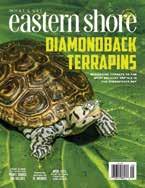

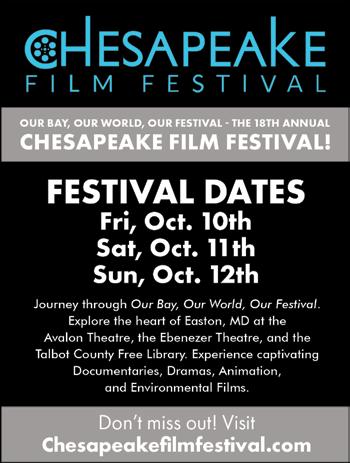



Where’s Wilma?
It's super September and our favorite flying mascot, Wilma, is soaring across the Chesapeake Bay region in her single prop plane to touch down in towns from shore to shore. Wilma love to eat, shop, and have fun at many of the area's best businesses. Where will she pop into next? Here’s how the contest works: Wilma appears next to three different ads in this magazine. When you spot her, write the names of the ads and their page numbers on the entry form online or mail in the form below and you’ll be eligible to win. Only one entry per family. Good luck and don’t forget to submit your restaurant review online at whatsupmag.com/promotions for another opportunity to win a prize.
to Angie S. of Stevensville,
E-mail address
Circle your age bracket: <25 25–34 35–44 45–54 55+
Would you like to sign up for our daily e-newsletters, which brings you each weekend’s best events and dining deals, as well as online-exclusive articles!
Yes, please! No, thanks
Entries must be received by September 30, 2025. Winner will receive a gift certificate to a local establishment and their name will appear in an upcoming issue of What’s Up? Eastern Shore. Mail entries to: Where’s Wilma? Eastern Shore, 900 Bestgate Road, Ste. 202, Annapolis, MD 21401 or fill out the form at whatsupmag.com/promotions I FOUND WILMA ON


